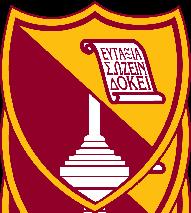




The Sixth Form embraces the holiday spirit in their support of their classmates on basketball’s “Senior Night,” for a 73-22 win over Prep Charter School, December 9, 2023
Schwarting ’24
This June, the Class of 2024 celebrates grit, brotherhood, and community. With thunderous support from family and friends, teachers, and coaches, one hundred eighteen onceSixth Formers cross the stage and hold the symbolic promise of diplomas—college, adulthood, and what lies beyond—in their hands.
As we leave 450 Lancaster Avenue,
adorned in maroon blazers and charcoal slacks, we, members of ’24, reflect on the years spent together. Novelty frequented much of the path to graduation. From Virtue and Virtual Villages in middle school to fragmented cohorts in Third Form year, the Class of 2024 shares a distinctive appreciation for time spent together.
Unity and brotherhood characterize this class like no other. From earnest assemblies
’25
After 40 years of teaching, 25 of which at Haverford, Dean of Faculty and Latin teacher Ms. Sara Adkins is retiring.
In her numerous positions throughout her time here, Ms. Adkins has played a role in the development of everyone with whom she has engaged. She served as Chair of the Language Department, a role in which she mentored fellow teachers, and she has served as Dean of Faculty for the last two years.
Beyond her teaching and administrative roles, Ms. Adkins has also been an integral part of the honor system. She and former math teacher Mr. Travis Loving were the first advisors to the Honor Council, and Ms. Adkins served as a faculty advisor to the Character Mentorship Program.
Ms. Adkins says this work had the great-

est impact on her.
“Over the fourteen years that I was on the Honor Council, my faith was restored in humanity and in youth, because I saw kids really understanding what a boy had done as a mistake, and wrestling with how to come up with an appropriate punishment for that mistake and that boy and that moment,” Ms. Adkins said.
con’t on p. 5

and three packed viewings of the spring musical, Beauty and the Beast, to collective hikes to athletic contests far and wide, the young men graduating share a bond they will not let fray—they provide no excuses for disconnection.
Of course, this Sixth Form cannot be characterized without interruption by the pandemic. For students like Sixth Form Student Council Representative Arsh Aggarwal,
the formative transition from middle to high school distinctly shaped life in the upper school.
con’t on p. 4

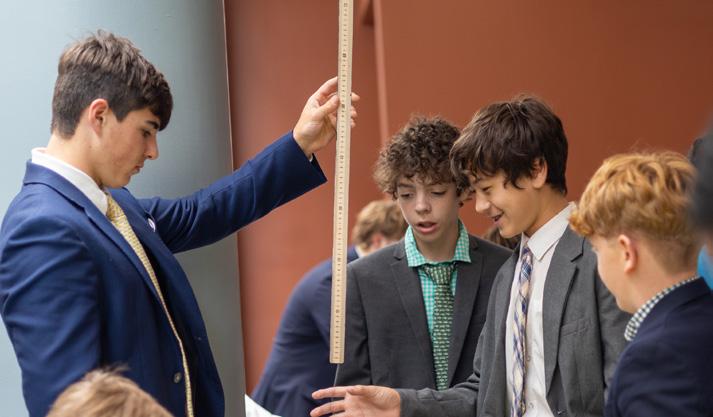

2024–2025 Sta
Ian Rosenzweig ’25
Editor-in-Chief
Connor Simpkins ’25
Editor-in-Chief
Elliot Lee ’25
Senior Managing Editor
Milan Varma ’25
Senior Managing Editor
Liam French ’25
Managing Editor
Abdullah Kanchwala ’25
Managing Editor
Tom Saul ’25
Managing Editor
Ajay Chakraborty ’26 News Editor
Ayush Varma ’27 News Editor
Ryan Wang ’26 Features Editor
Matt Lo ’27 Academics Editor
Adam Brown ’27
Neighborhood Editor
Ryan Hu ’26 Campus Opinions Editor
Peter McConnell ’26 Campus Opinions Editor
Grayson Morgan ’26
O -Campus Opinions Editor
Michael Bartholdson ’25
O -Campus Opinions Editor
Luke Ganley ’25 Arts Editor
Quinn Sullivan ’25 Sports Editor
Nate Gill ’26 Sports Editor
Ms. Emily Harnett Faculty Advisor
Mr. Thomas Stambaugh Faculty Advisor
The Index is a student-run publication of the Haverford School that does more than bring news: it provides the diverse perspectives of the Haverford student body. It is an outlet for student writers to take stands on issues they deem important. It chronicles the daily struggles and accomplishments of the Haverford community. The Index also provides a forum for discussion of pertinent issues, such as student culture, academic policy, and Haverford’s place in world a airs. The Index presents new ideas and aspires to in uence constructive change.
All opinions and viewpoints expressed herein do not necessarily re ect those of The Index or the school. The Index is designed and produced digitally. Photographs may be retouched. Submissions and letters to the editors regarding any and all articles are welcomed at index@haverford.org
The Index, a member of the Columbia Scholastic Press Association, is composed using the applications of Google Suite and Adobe Creative Cloud. Its surveys are conducted via Google Forms and are advertised on email to current Haverford students. Graphic designs are created by Index sta via Canva. Southern Dutchess News prints 200-400 copies of each issue, and its editorial sta distributes them in the Upper School on the day of release. The Index serves the needs of a total school population of 1152 community members, consisting of 952 students and 200 faculty and sta members.
Contact The Index: 450 Lancaster Ave, Haverford, PA 19041 index@haverford.org
Twitter: @Haverford_Index
Instagram: @Haverford_Index Volume 91, No. 9 - June 4, 2024
The end of the school year is always lled with both nostalgia and excitement. First and foremost, we want to extend our heartfelt congratulations to the Class of 2024. Your hard work, dedication, and leadership have lled the halls of Haverford and set an example for all. You will be missed.
This year, we focused on courage. In classrooms, on playing fields, on stage, and through Reflections shared in Centennial Hall, the Sixth Form reminded us that courage is not the absence of fear but rather the willingness to act in spite of it. Sixth Formers: as you move on to college and beyond,
remember the courage you have shown at Haverford and carry that with you through all of your endeavors.
We also want to express our gratitude to our readers, contributors, and supporters, who have made this year so memorable. Your passion, creativity, and commitment to excellence have made The Index a true reflection of the spirit of Haverford.
The coming school year will bring exciting challenges to our community. In an age of increased societal tension, misinformation, and polarization, trusted journalism is more important than ever. The Index encourages the Haverford community to keep
an open mind, pursue truth, and engage in dialogue. Built on a code of respect, honesty, and courage, our diverse community is primed for uniquely constructive exchanges of ideas. The Index will remain a forum dedicated to fostering an environment conducive to civil discourse as we strive to fulfill our mission and serve as the voice of the Haverford community.
To maintain that environment, we encourage the student body to take the opportunity this summer to grow and learn. Return in the fall prepared to maintain the values that make Haverford special.

2024-25 Editors-in-Chief Ian Rosenzweig ’25 and Connor Simpkins ’25
Josh Williams ’25
Gentlemen, summer break is upon us. Summer break stands as a bu er period between the past and the future of e Haverford School. Each and every one of you gets three months to put some time into something. After a long year of learning, studying, and performing, you all get some nice relaxation to compensate for the e ort you put in. is time is not a gift, it is a prize for all of your hard work.
Use this time to do something you love and enjoy. Whether that’s a sport, a job, or leisure time on the beach, make sure you cherish this extra time for hobbies. You may not be under the Haverford roof, but Haverford is still going to be with you.
If one of your brothers is in a pinch, reach out your hand like they would do for you. If you are struggling at some point, remember the virtues of Respect, Honesty, and Courage that can guide you through the darkness.
This past year should make you all so proud. We did some incredible things as a student body. We won achievements at every level for all activities, whether it be sports, robotics, Model UN, Mock Trial, Speech and Debate, or anything else I didn’t mention. We also brought home the sweater for another year in a row. On top of all this, we strengthened the sense of brotherhood within the student body for another year.
These achievements should make us so excited for the future. These achievements are things we can cherish going into next year so that we can build off of them.
Last year was great, but it wasn’t devoid of issues. These problems, small or large, are things we will work towards correcting next year. Things like AI use, locker room clean-
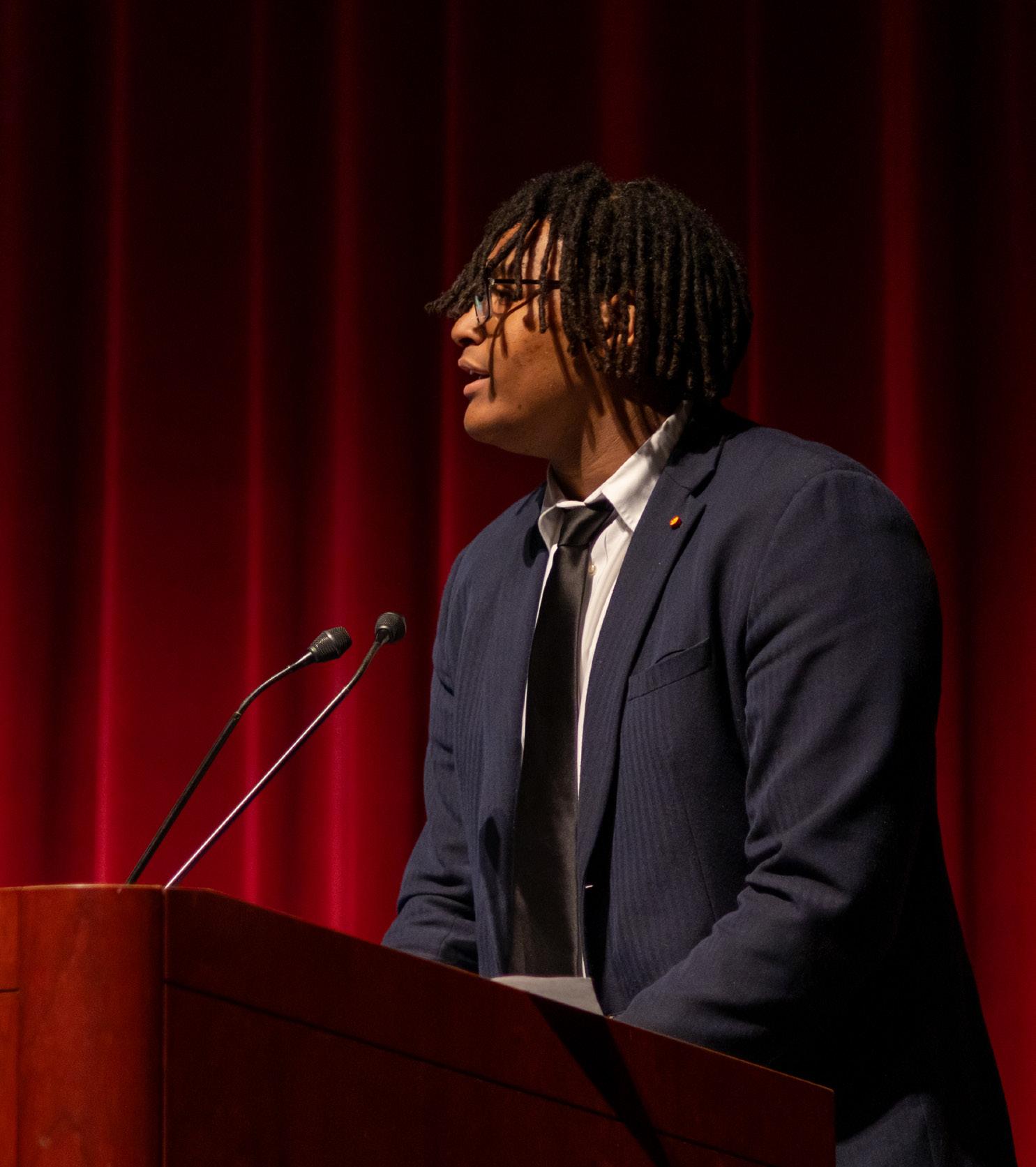
liness, and character during sporting games are all things we will work towards correcting next year.
Having a “Brotherhood” entails holding your brothers accountable and to the standard of The Haverford School. So if you see someone leaving trash in the locker room, HELP THEM BE BETTER. That is what real leaders do. It may not always be comfortable, but it is always worth it in the
end to
a
We are
the
and I cannot wait. I hope you all cannot wait either. Next year is going to be special.
Thank you and GO FORDS!
Throughout the school year, students have worked hard in academics and extracurriculars, overcome challenges, and made this school year a great one.
The boys in maroon and gold have helped each other celebrate victories and learn from mistakes, building camaraderie and community. Some notable events from this year include EA Day, the fall play and spring musical.
EA Day, played at home this year, was a big rallying point for the community and the pinnacle of what the community is all about.
“The school spirit was fantastic this year,” said Fifth Former Luca Aloi, who helped the Fords soccer team defeat EA.
“The support we have at Haverford is unmatched, contributing to another successful year in athletics, personally and schoolwide,” Aloi said.
“EA Day brings the school together in a lot of ways,” Fifth Form Student Body President and football player Josh Williams said. “There are lots of events before the actual EA Day, including spirit week and senior week, which all help show how we have pride in how we work to strengthen the community, even for one week… the community [support] strengthens our play.”
Fords basketball was also popular this year.
“The Penn Charter game was one to remember,” Third Former Lucas Crutchlow said. “The student section for the Malvern game was the biggest I’ve ever seen for a Fords’ basketball game. I still think that even though we lost, we still demonstrated what the Fords can do when we all come together.”
Along with athletics, the performing arts also excelled this year.
The Haverford 2024 musical, Beauty and the Beast, was a sell-out show for all three days it ran.
Sixth Former Render Ford, who played Cogsworth, said, “It was an amazing feeling. Something special about Haverford is that people treat any event, sports game, or show, like a community task to show up and support people.”
“I definitely recognize that it is a defining quality of the brotherhood that we have here and one of the best representations of it coming to light,” Ford said.
Clubs were yet another area of excellence this school year. Fords had some major accomplishments from Robotics, Model UN, and Mock Trial.
“The clubs this year have been great,” Third Former Deacon Golderer said.
Fifth Form student council member Milan Varma said, “We had lots of students involved in Model UN, Robotics, and Mock Trial. Robotics performed very well. The A team won the state championship and advanced to the world championship. In Mock Trial, we made state finals after a long season with the biggest team we’ve ever had.”
Model UN also performed well at the Ivy League Model UN Conference, where the Fords earned multiple fourth-place awards.
When the Fords were not rallying together for their team or friends in the musical they could be spotted playing in the snow on various snow days. Fords had three snow days this year.
“It was a cool feeling because we have not had a snow day in two years,” says Third Former Ray Kresge. “It was very chill to just be able to relax and go sledding.”
“Having good leaders and members of the community guided us to success. This year, we had good senior leaders that set a high standard for the rest of the school. The Student Council, Signet Society, and Honor Council had great leaders,” Williams said. “The brotherhood was tight and was heavily
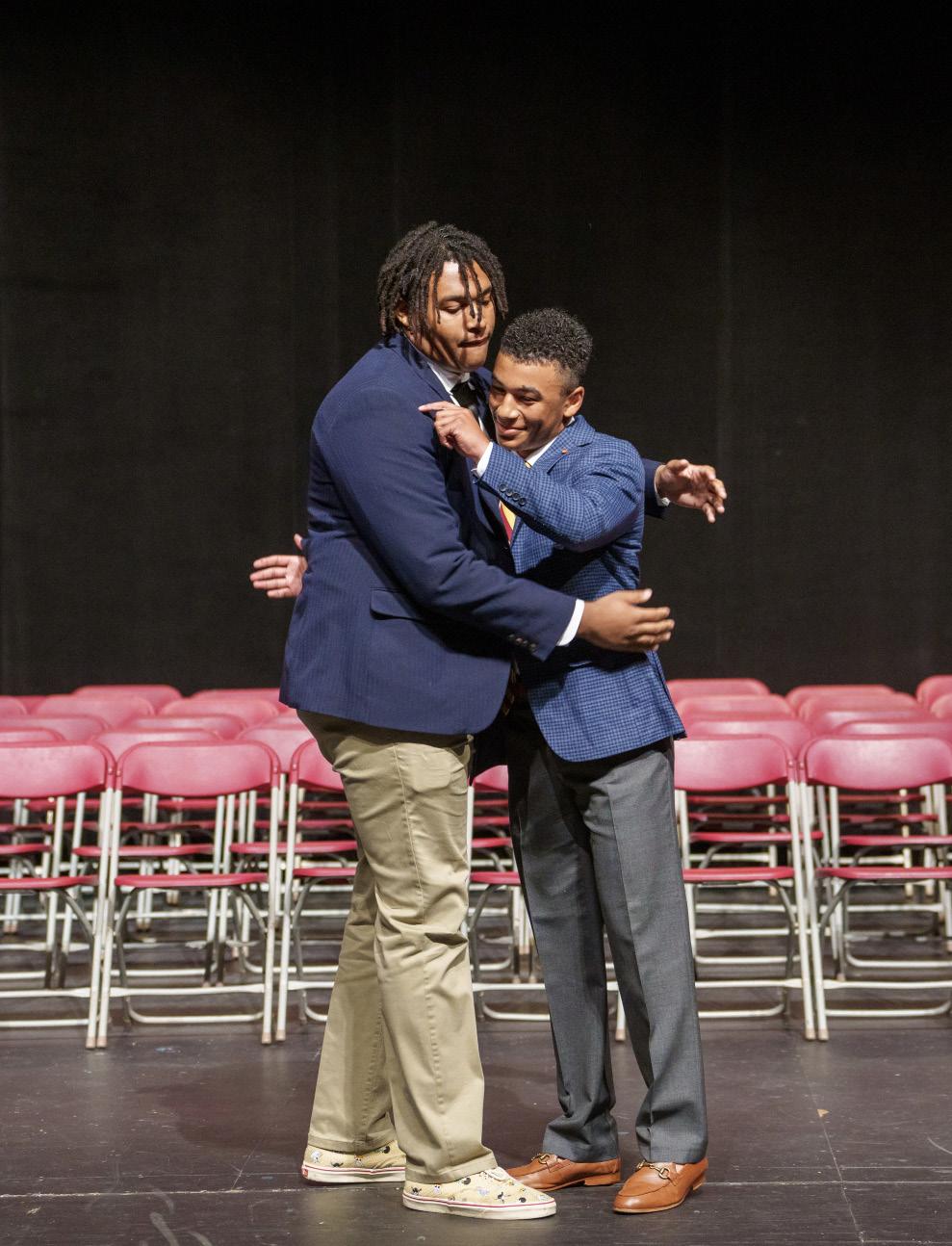
Sixth Formers are the leaders of the school. ey lead the sports, they run the clubs, and they set an example. e Class of 2025 hopes to step into these shoes e ectively next year.
One of the main student leadership bodies at Haverford is Signet Society.
“Signet is meant to be the gentlemen that represent the school,” said Sixth Form Dean and Spanish teacher Ms. Brooke Kenna. “They embody the values and characteristics of the school.”
The Signet Society members for the 2024-2025 school year were recently announced at the Rosettes Ceremony in early May. They hope to live up to the standards that past Sixth Forms set.
“In general, we want to be leaders that the rest of the school look up to,” said Fifth Form Signet member Phineas Manogue.
Signet also hopes to get the Class of 2028 prepared for next year. “We want to get the new freshman acclimated to high school life,” Manogue said. “This includes the Camp Saginaw trip.”
The Camp Saginaw trip is a two-day excursion to Chester County. All Third Formers attend, and members of Signet are responsible for running the trip.
“We’re looking for guys who can lead the younger students,” Ms. Kenna said. “We want to create a strong bond between the older and younger students.”
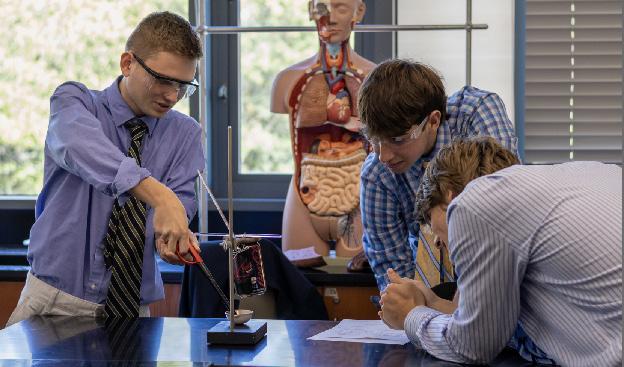
“I’d like to see the seniors do more than just lead by example,” Manogue said.
“One of my favorite parts about Haverford is the integration of [other forms] to make a broader community.”
Looking at the Sixth Form holistically, they want to accomplish many things as leaders.
Fifth Form biology students participate in a calorimetry lab
Every past
impacted by our school body president Asa Winikur’s goal to try to increase the school spirit.” Sixth Form has stepped up to the plate as leaders in different ways, and the Class of 2025 has a clear plan. “We’ve had some really great leaders in the past,” Ms. Kenna said. “However, there’s always more work to be done. I’m excited to see what the new Sixth Form has in store for us.” Keith DiMarino ‘27 and Ayush Varma ‘27 Josh Williams ’25 embraces Asa Winikur ’24 at the Rose es Ceremony, May 10, 2024 Ajay Chakraborty ’26“I really hate to even mention the pandemic at all, but if I could trace what makes our class what it is back to one thing, it would be a collective sort of suffering from the pandemic,” Aggarwal said. “A lot of us really missed out on a lot of formative moments like the Rite of Passage and the trip to Puerto Rico. Coming into freshman year we were in masks and on and off virtual. We didn’t have a traditional Haverford experience.”
Sixth Former Tripp Ronon shares a resistance to the pandemic period.
“It was not in our control. The Class of 2024 could have gone entirely differently without [COVID] that happened at the beginning of freshman and sophomore year.”
While virtual spaces and social distancing may have shifted the first experiences of this class, what truly sets ’24 apart is how hard we worked to restart our communities—to come back together stronger than ever.
“We all made the subconscious but collective decision to buy into Haverford in a way that no other class had ever done before,” Aggarwal said. “We knew how special our bond was because it had been taken away from us, and I think more than anything we just wanted to make up for lost time and be together.”
And this collective buy-in we share— the Haverford spirit of upright conduct and abounding energy—redefined the expectations of normalcy.
Sixth Former Chase Nelson said, “Our respect for each other [is our strength]. We’re selfless, tolerant. When I look back to our underclassmen years, I saw us struggling to find upperclassmen leaders. Now, I feel like our class did such a good job of setting a good example for the [underclassmen].”
The traces of our class’s leadership left visible imprints on the community.
For Nelson, highlights include “the first week of trips—going on camping trips and day trips with underclassmen [and] when we won the soccer game at EA day.”
“The face of the varsity soccer players was surreal when we stormed the field. I loved seeing everyone come together,” Nelson said. “The EA Day Video, too—kudos to [Sixth Former] Asa Winikur on that video. It hyped everyone up.”
But the Sixth Form’s leadership took shape in formal, uplifting spaces too.
“I think we can be really proud of the bar we set on the reflection series this year,” Aggarwal said. “Whenever you talk about what makes a class great, it’s usually intangibles that aren’t really quantifiable or that don’t last long enough to be made a legacy.
For our class, the Class of 2024, we can be known for pouring our hearts and souls into each and every one of our Reflections this year. I think it sets a positive tone for the coming years of students as to how meaningful a Reflection can be if done with purpose.”
And earnest many of us were in front of our brothers in Centennial. From humorous accounts of long commutes to vulnerable meditations on image, mindset, and outlook—we’ve given ourselves the opportunity to see each other beyond singularity.
Aggarwal describes this year’s Reflection series as having a “domino effect—the entire community rallies around that particular student and afterwards especially, the student is thanked and congratulated by everybody, not just their specific friend or teacher group.”
Alongside our collective strength, ’24 honors each individual’s strengths.
“We’re not a monolith,” Ronon said.
“When talking about our strengths and accomplishments, we have so many—especially on the individual level. As a collective, we’ve all made it… We all know each other.”
“ is is the only class I’ve ever interacted with that actually spends time with each other outside of school as a whole.”
ARSH AGGARWAL ’24
For many, that spirit continues beyond graduation. Speaking of life in the future, he said: “I want to invite [peers] to dinner or something. I want to get to know them [in the future].”
Aggarwal, alongside Sixth Former Casey Williams, dedicated three-weeks to tracing the memories, distinctions, and communities of the Class of 2024 in his graduation project—a documentary celebrating ’24. For him, this proved not only rewarding, but insightful.
“Making the documentary has been one of the best experiences of my high school career because I feel like I’ve gained a much deeper understanding of our class as both individuals and as a whole,” Aggarwal said.
Teachers and faculty have gathered the unique brotherhood of ’24.
“Talking with teachers during interviews for the documentary, [our unity] became evident. I think a lot of that can be attributed to us not having had a normal start to high school and simply making the most of all the time we had together. Our
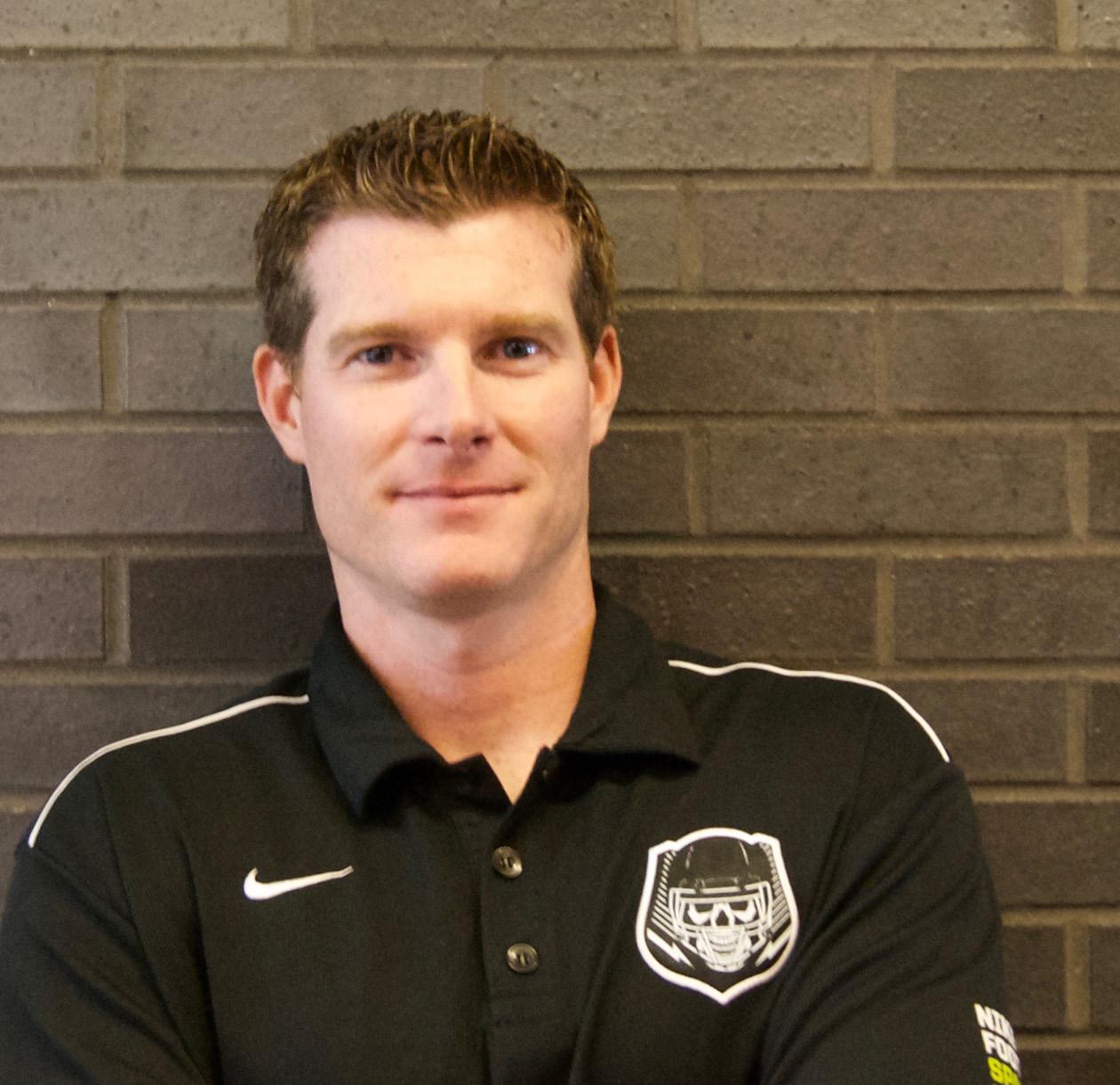
experiences hold us together,” Aggarwal said. “That’s what makes us who we are.”
On the final day of classes for the Sixth Form, Form Dean Ms. Brooke Kenna wrote, “[I am] very proud and thankful for each of you.” She recounted leadership, such as that by the Signet Society, to be among the most compelling she’d worked with.
Across the Class of 2024, gratitude— for years spent learning, growing, and bonding—remains foundational to our experience. Sixth Form Student Body President Asa Winikur is thankful for the opportunity to have such a brotherhood.
“I appreciate [the Class of 2024] more than you could imagine and I am so proud and blessed to belong to this brotherhood,” Winikur wrote in his final letter to the student body.
Foundationally, community as a class typifies the strong connections we hold to each other. Aggarwal calls this our “togetherness.”
“It’s [rare] to find a class where you can genuinely say that every single person gets along with another. For me, this is the only class I’ve ever interacted with that actually spends time with each other outside of school as a whole, not just small, disconnected friend groups,” Aggarwal said, “Whether it be on senior skip days, coming together as an entire grade, or even Memorial Day weekends at Avalon hanging out, [it’s] truly special, and I think that embodies everything our class stands for.”
Class of 2024, it is an honor and a gift to have shared these formative years together. Outlining our memories are the forever earmarks of our camaraderie: there are many memories still to be made—on the commencement stage, and hopefully well into the future.

The Index wishes nothing but the best for Dr. P.J. Vanni, who is leaving the school after his long career at Haverford. We wish him luck in the next chapter of his life.
“It’s the interaction…the sharing of thoughts and ideas,” Ms. Adkins said. “The biggest joy [of upper level Latin] is every single time, even if I’m reading the same piece of Latin literature, somebody comes up with a different take. Somebody sees something that I didn’t see before, or somebody reacts to something I say.”
“ e kids and the colleagues are what make this place really interesting, and make it sort of new every year, even though I’m teaching the oldest thing there could be.”
MS. SARA ADKINS
Ms. Adkins’ passion for her Latin classes allows her to connect with her students and bring them into the ancient world. “If I find the joy in it, then that allows the kids to find the joy,” she said.
Much like her work with the Honor Council and CMP, Ms. Adkins looks to con-
nect with her students and colleagues as she teaches and mentors.
“When I’ve needed advice or perspective for dealing with some of the harder parts of my job, she’s unfailingly offered both,” Head of Information Services Ms. Lisa Snyder said. “At the end of such conversations, she will acknowledge, in some form or other, that, yes it’s a hard thing you have to do, but you can do it!”
“A key thing I’ve always done is [to say] ‘I’m doing this with you. We’re doing this together,’” Ms. Adkins said. “Let’s find it hard together and tease it out together. Let’s wrestle with the Latin.”
Although her retirement is the culmination of her time working with students, she has no plans to leave Latin behind. She plans to continue reading a number of Latin works as well as to get back to reading Ancient Greek.
In addition to spending increased time with her reading list, Ms. Adkins also hopes to travel more.
“My wife has actually been retired for five years, and she wants a partner in crime, and I’d like to be that partner in crime and still be young enough to actually enjoy it,” Ms. Adkins said. “It is the right time, but it’s bittersweet.”
Reflecting on her tenure, “The kids and the colleagues are what make this place really interesting, and make it sort of new every year, even though I’m teaching the oldest thing there could be,” Ms. Adkins said.
“My colleagues are bringing their Agame all the time, and that doesn’t happen in every school where your colleagues push you to be better and show you ways in which to be better. This is a very collaborative place.”
Ms. Adkins also shared her love for the camaraderie and brotherhood that the school fosters. She referred to “Haverford moments”—memories of when the “community knew how to rally behind in a way that is basic, good, human behavior.”
“If you can share the laughter, then that means there’s a connection and you can go deeper...”
MS. SARA ADKINS
Ms. Adkins leaves the community with a legacy of compassionate mentorship and
strong leadership.
“As a teacher and as a mentor, she is somebody who makes everybody better, whether you’re talking about her students or her colleagues,” fellow Latin teacher Dr. Andrew Fenton said.
Having played a pivotal role in building both the community standards and the academic life of the school, Ms. Adkins shared her final advice for her colleagues and students.
“There’s room for humor in everything. That’s the hallmark of my classes, myself, and that humor is never at anyone’s expense,” Ms. Adkins said. “It’s been something that has been a really helpful tool in my particular arsenal in being able to relate with kids and get them on whatever train I’m driving or whatever thing we’re trying to do—to see the good in humanity and see the humor in the things that we’re doing, because if you’re not having fun and seeing the fun and sharing the laugh with someone, then it’s so much harder to share the sorrow and the hard times.”
“If you can share the laughter,” Ms. Adkins said, “then that means there’s a connection and you can go deeper and you can have really good relationships and great times together.”
Dr. Callie Ward loves teaching.
The story of how she came to Haverford stems from her reliance on teaching as an outlet to de-stress and be creative.
“I started at Haverford as a long-term sub. I was already in the Philadelphia area (I did my undergrad at UPenn and was TAing in a class there). I had finished the Ph.D. and I knew I wanted to get into high school teaching. Then, a job at Haverford opened up, and it was just kinda the perfect opportunity,” Dr. Ward said.
In her brief time here, Dr. Ward has impacted the academic careers of many students. She has opened minds and cultivated the literary skills of young writers. She teaches English II and English IV* as well as two Sixth Form English electives: Matters of Life and Death: Literature of Migration and The Language of Film.
Sixth Former Russell Yoh, a student in Dr. Ward’s English IV* recalls that the class “challenged students to see other perspectives.”
This was highlighted when the Sixth Form read Ta-Nehisi Coates’s Between the World and Me. The discordance of the text “caused me to become a better writer and interpreter of text,” Yoh said.
Sixth Former Chase Nelson enjoyed one of her seminars.
“I really enjoyed her Language of Film class. Dr. Ward helped me realize a bunch of my critical thinking skills were pretty unpolished. She also taught me attention to detail,” Nelson said.
Her in-depth classes challenge students to broaden their field of view, and she’ll miss these electives and the Sixth Formers as she departs for Germantown Friends School.
Despite her two-and-a-half short years at Haverford, Dr. Ward is well- integrated into the community.
What has stood out most to Dr. Ward is the opportunity that Haverford offers its students. She urges her students to take the ample opportunities, “ I see them as what makes Haverford such a special place… I think a lot about what you all are going to go off and do, especially with teaching so many seniors. I just hope everyone will really make the most of their college experiences and soak everything up and use the founda-
tion they have earned here at Haverford to change the world.”
Dr. Ward comments on her film class, “I try to choose things that people wouldn’t necessarily have encountered before or seek out on their own, especially for seniors. I think it’s a nice opportunity to expose yourself to something before you go off to college and have to figure everything out on your own.”
Dr. Ward formed her Migration Literature class from personal experience and world experience.
“I think my biggest impact on the curriculum is through the electives I’ve created. There was a discussion about what’s already being offered and how we can not repeat what’s already being offered and how we can
bring something new to the table. I thought that was fairly easy for me to do since no one in the English department teaches anything related to migration.”
Thus, the course “Matters of Life and Death: Literature of Migration” was born.
“I have so much real-world experience with that too, and have read pretty widely and very deeply when it comes to Latin American text,” Dr. Ward said. “It was easy for me to pivot and turn the idea into a more global approach by adding a graphic novel by a Vietnamese American author, for example.”
Dr. Ward is optimistic about the curriculum at GFS. “Even in a standard 9-10 curriculum, there’ll be room to slip in short stories that I’m interested in teaching. It won’t
be a course I’ve constructed entirely myself, so I’ll miss teaching migration literature and film.”
When asked what she will miss most about Haverford she jokingly replied, “The power bowl for lunch.”
“I’ll miss spending time with my colleagues,” Dr. Ward said. “We make each other laugh every day, and I’ve been incredibly grateful to be part of such a smart, supportive, and caring group of teachers.”
“And of course, I’ll miss the relationships I’ve developed with students here—not just in the classroom, but through GSA, Model UN, Creative Writing Club, and other groups I’ve led.”
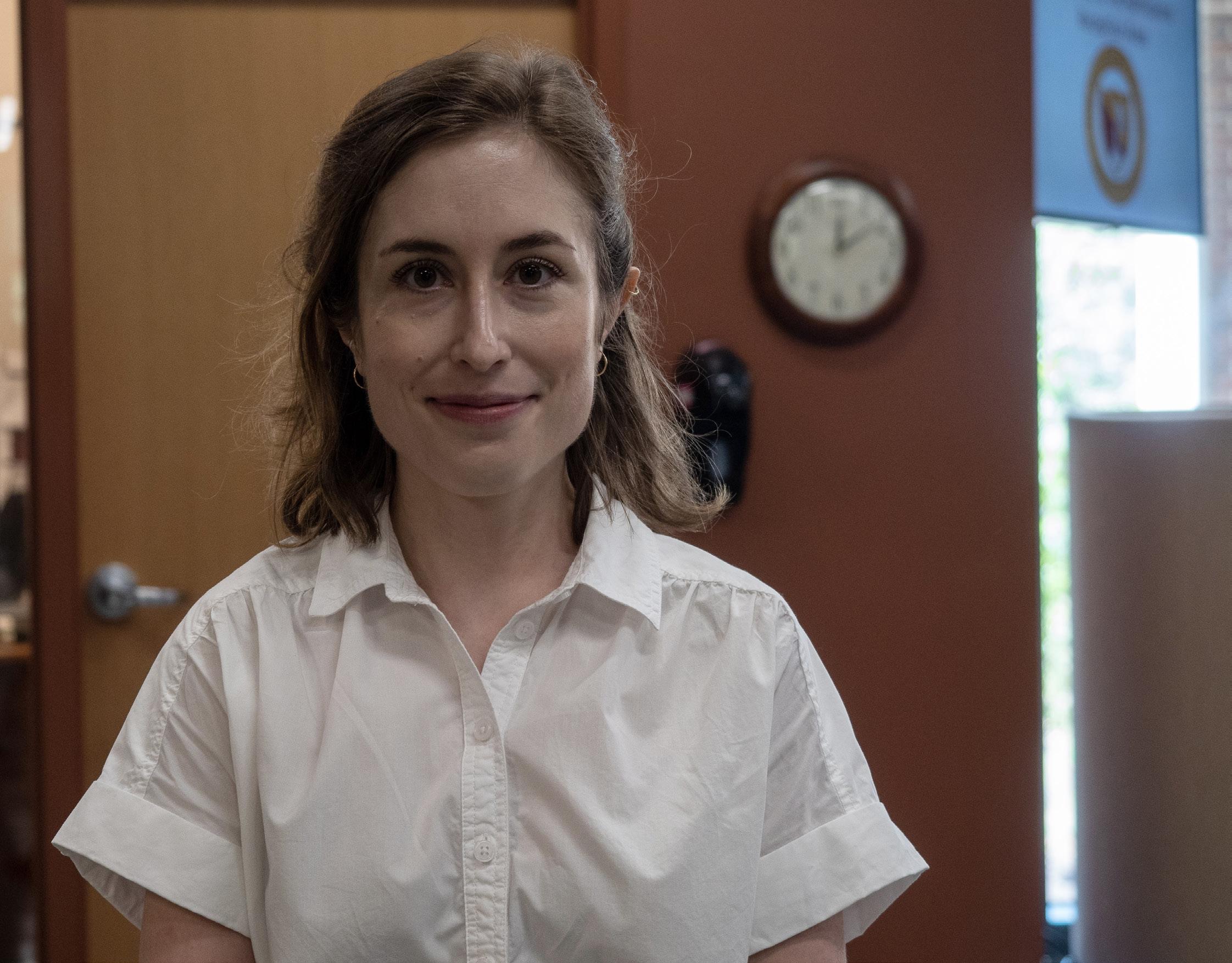 Dr. Callie Ward in a 2022 photo
Dr. Callie Ward in a 2022 photo
“Iwas like a celebrity in my hometown,” Sixth Former James Gates said, as he stood up from the wooden piano bench in one of the practice rooms in the Conservatory.
He said this jokingly, but really, he was a celebrity in Iowa. The piano prodigy was featured on the news numerous times, where many marveled about how rare his talent was. Thanks to a concert he organized, his school was able to raise enough money to invest in a grand piano. He has also won numerous awards and competitions, including the Harmony for Peace Music Ambassador Competition. He has even performed at Carnegie Hall.
Now, through his viral social media pages and top-notch talent show performances, he has also made his mark here at Haverford.
Gates discovered a new way to explore his passion just a few years ago.
“During the time of COVID, my piano teacher passed away, and that was hard for me, so I started doing online concerts, and I built a little bit of a following from that,” Gates said. “At that point, I had like 5,000 followers from streams on Instagram and Reddit and stuff like that.”
He grew determined to expand his audience.
“I decided ‘this social media stuff is kinda cool,’ so I started studying up on Instagram Reels on what kind of stuff was going viral. It was pretty cringey stuff at the time, but I was like, ‘I’ll just see what I can do,’ and I made these videos that were getting a lot of views,” Gates said. “I think I had like 200 million views in 2021, and that really propelled my account.”
Gates has now amassed over 51 thousand Instagram followers and hundreds of thousands of YouTube views.
The experience has changed his perspective on “virality” and social media.
“I don’t really post much anymore. I don’t really care about going viral, but it was kind of a cool thing that I did freshman and
sophomore year, just for fun,” Gates said.
“The videos that I do post are videos of me pole vaulting and playing piano, not so geared towards going viral anymore, but it still brings me a lot of joy.”
Pole vaulting has grown into a new passion of his in recent years.
“Freshman year during our track warmup laps, I would run on the retaining wall instead of running on the track, which was pretty risky as the wall is thin. Mr. Kolade noticed, ‘You should do pole vault, James,’ because pole vaulting is a risky sport,” Gates said. “That’s how I fell in love with the sport.”
Now with a personal record of fourteen feet and a first-place prize from the Pennsylvania Independent Schools Athletic Association, it is safe to say Gates has grown very skilled.
Gates’ coach, Mr. Jesse Ohm, who works at Penncrest High School, has been working alongside him for most of his pole vaulting career.
“In pole vault, it’s all about the heights you’re able to achieve, and he’s been able to progress over the years for sure,” Ohm said. “I’ve also seen him grow in a maturity factor as well in his ability to assess where he is and gauge the drills and the work ethics that he has to put in.”
Ohm also admires Gates for his ability to improve after failure.
“Like any sport or talent, there’s always ups and downs and roadblocks, but he always perseveres,” Ohm added. “Even when he doesn’t do his best or as good as he hoped, he’ll always get right back up and work hard to take another stab at it.”
Gates most enjoys pole vaulting because of its adrenaline rush.
“It’s a big contrast from music, but it’s definitely thrilling,” Gates said. “I enjoy the excitement of sprinting down the runway and planting into the ground with a pole.”
Pole vaulting and piano remain at the forefront of his passions, but he is also a talented ceramics artist and golfer.
While many might think balancing
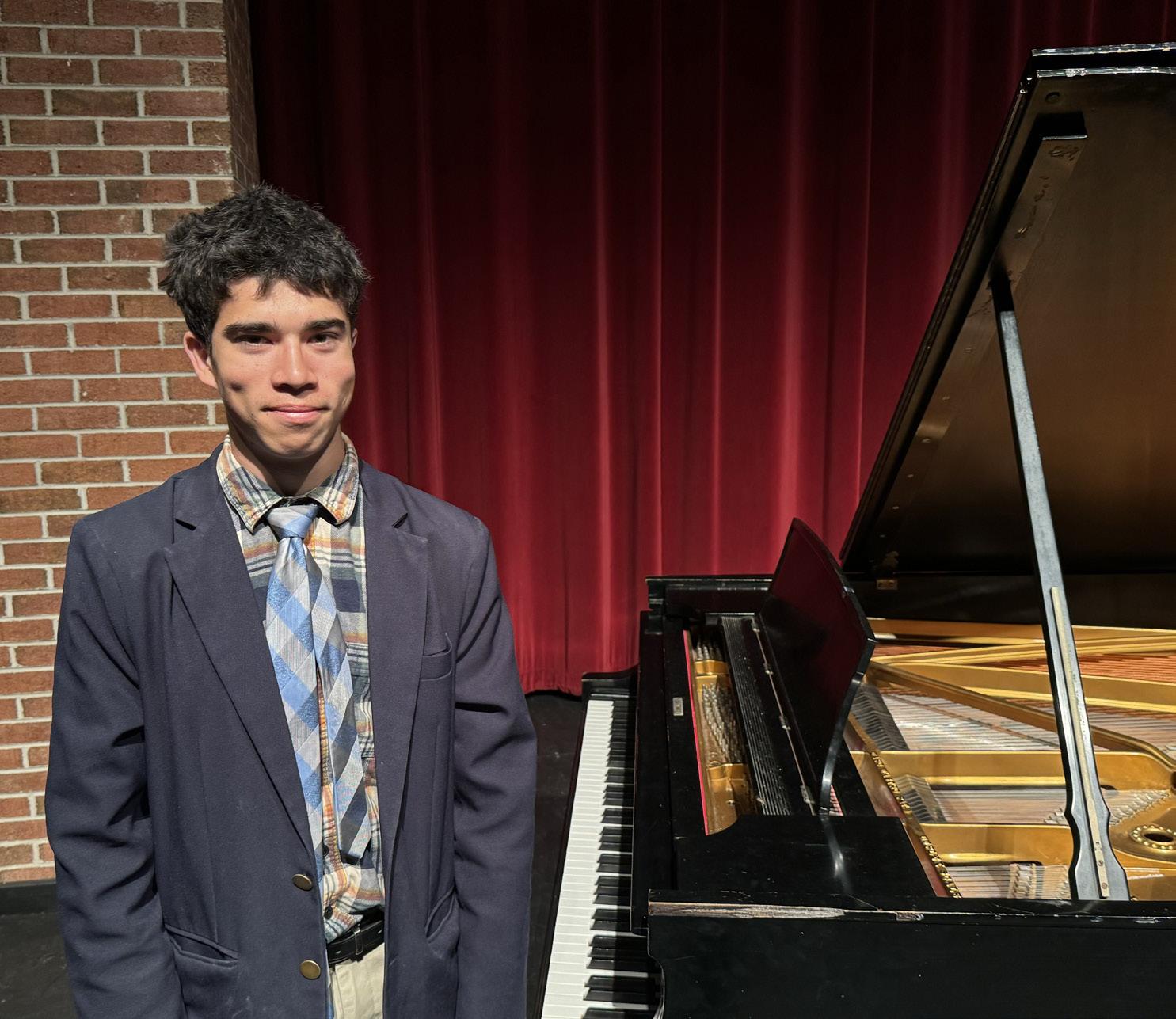
these time-consuming passions would be difficult, Gates seems to do it with ease. His brother, First Former Noah Gates, admires that.
“I think he balances it by not prioritizing his hobbies like pole vaulting and piano. He makes sure to get his work done. If he can improve in his classes, he will do that, while also improving in piano and pole vaulting,” Noah said.
Moving forward, Gates is unsure of what is in store. He wants to continue pole vaulting, but maybe not in the long run.
“I’m going to be doing pole vaulting in college, but after that I probably won’t,” Gates said. “I might just do it as a hobby, or maybe being able to coach would be something that I would be interested in.”
Music and piano, however, will stay with him forever.
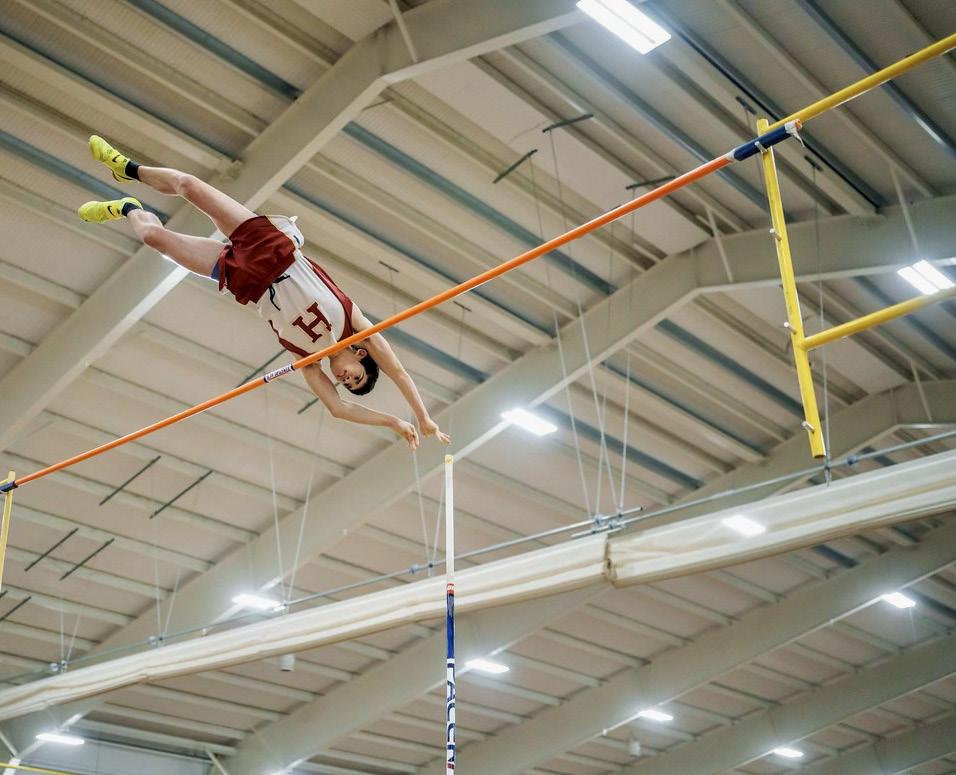
“Music is something that I plan to do for my whole life… Whatever facet I choose to continue music in, I know it’ll be a rewarding experience for me. Whether that be performing for friends, playing for church, doing concerts, or anything else,” Gates said.
Performing has always been at the forefront of music for him, so it makes sense that he hopes to keep it that way.
“I don’t care how many people I’m performing for, I just enjoy performing,” he said. “It is just nice to know that people are enjoying the music that I am spreading.”
At Gates’ most recent performance, at this year’s talent show, he brought a new element into his performance: his voice. His performance of Tracy Chapman’s “Fast Car” was filled with raw emotion.
Now a member of the Notables, Gates has been taking voice lessons for a few years, enjoying the vulnerability that comes with singing.
“With singing and lyrics, I can express a lot,” he said. “You still can with piano, but I think through singing you can be more specific with the lyrics and whatnot and the stories you tell, and that’s why for the talent show I wanted to sing—because it’s my senior year and I’ve never really sung that much in public before.”
Gates was up to the challenge.
“I had never sung solo in front of the whole school, so that was something I wanted to do,” Gates said. “I practiced a lot for it, I was really nervous, which I wouldn’t have been if I just played the piano like I do every year… but I wanted to try something different, just for myself, I guess.”
While he has already released multiple songs onto streaming platforms (earning over 300,000 streams combined), he plans to improve his craft more in his songwritingthemed senior project; it will be exciting to see where he goes creatively.
roughout all of Gates’ successes, he remains humble.
“His integrity is probably his best quality,” Noah Gates said. “He does the right thing even if no one is watching him, and that’s a great trait.”
Mr. Ohm marvels at Gates’ overall attitude and disposition.
“His personality is one that is rare. He’s very polite, very caring. I’ve never seen a mean bone in his body… He is somebody you can certainly get along with, and his road to success has never been on the backs of somebody else,” Ohm said. “He’s always going out of his way to help others, and I nd that to be very admirable.”
Russell Yoh ‘24Although his days no longer start with a 3:45 a.m. lift before his long commute to school, Sixth Former Tanner Vogel still maintains a unique daily routine during the weekdays and the weekends.
His alarm now rings at 5:45 on school days, leaving him plenty of time to shower, get dressed, and drive 25 miles from Coatesville, PA. The drive usually takes about 40 minutes in his manual Honda Civic. When he arrives at school at 7:30, he has plenty of time to enjoy potatoes with hot sauce, sausages, and a biscuit.
As a Sixth Former attending Purdue University next year, Tanner constantly balances schoolwork with his many interests, as well as his home life and family. Vogel’s afternoons usually consist of a daily five-toten-minute debrief with his mother after the long drive home.
Afterward, he gets in a lift before completing a hefty load of homework, whether it be Advanced Chemistry, Page & Stage, or Government & Politics. Tanner is known for his academic prowess, achieving high grades in advanced classes. He was inducted into Cum Laude society this school year.
After dinner—whether it be takeout or Mom’s cooking—with his parents and younger sister, Tanner is in bed around ten, ready for another early morning.
Living in a place like Coatesville, with sometimes acres of land between houses, an abundance of farms, and scarce stores and restaurants, Vogel’s hobbies and weekend activities are question marks to many.
Tanner works at Icore Fitness, an American Ninja Warrior gym.
“I’m either working the desk, which is only about 45 minutes of actual work on an eight-hour shift, or I’m working on the floor, where my job consists of walking around and convincing people to try things, and playing on trampolines and obstacles, so it’s hard to consider it ‘work,’” Vogel said.
The job comes with its perks, as Vogel often goes in when Icore is closed to lift with his boss, Alex, three-to-four days a week.
“My boss is my boy,” Vogel said, adding that knowing his boss on a personal level makes work all the more fun.
But with a recent weekend off of work—a rare occurrence—Vogel took the time to enjoy himself. Saturday morning started almost as early as any school day, but instead of being in the classroom by 8:30, he was on the first tee box of Ingleside Golf Club. Despite the rather brisk conditions, he shot a solid 89— not bad for only playing once or twice a month.
After a well-earned relaxing Saturday, Sunday was the peak of the weekend.
Vogel and his father headed out to the Penn Dutch Sportsman range to practice shooting and sight in some guns for upcoming tournaments. Tanner picked the hobby up with his father, shooting BB guns at six, and he has pursued it more seriously ever since. Besides an enjoyable hobby, Vogel sees it as the main way he and his father spend time together.
Whether it be an IDPA tournament with ten rounds of pistol-only shooting, or a two-gun match, with three longer rounds of pistol and rifle, Tanner spends the little free time he has working on his patience and aim.
The 35-minute drive to the gun range in New Holland, PA, runs through Amish country’s rolling green and yellow fields, quaint houses, and horses and carriages. The day’s conversation consists of senior assassin talk, starting with Tanner’s father berating him for his early elimination. “I just don’t understand how you managed to get out one minute after school ends,” Mr. Vogel said.
After shamefully explaining that he had been resting his jug on a table outside of the art rooms for only a second, Tanner changed the topic to the obnoxious safety item, with the end of round 2 and the start of round 3 only hours away.
“I think you should have to carry around a flag on a pole, but you can’t let the flag touch the ground or you’re not safe,” Mr. Vogel suggested.
His son offers a different approach. “I’m
“Isaying it should be an inflatable pool donut that has to be around your waist for you to be safe,” Vogel said, “so you can’t really sit down anywhere outside of school buildings.”
The truck rolled past a carriage on the side of the road that read “CARRIAGE FOR SALE. $3500 (2003 MODEL)”. Mr. Vogel jokingly suggested towing the carriage behind the truck and making him and his sister sit in it, to which Vogel shook his head.
Vogel enjoys going to the range because it gives him an opportunity to spend time with his father. It also gives him a chance to get away from his busy life. He finds it calming, being in a secluded spot in the woods, not having to think about schoolwork or college.
Tanner practiced a few rounds on the pistol range at 10 feet and 30 feet before moving to the open range to sight in his rifle on the 100-yard target. Mr. Vogel used a newly acquired camera and receiver to monitor the target up close, so that sighting in the scope based on each shot became a more efficient process. After about two hours, the Vogels headed back through the countryside towards home.
The end of the afternoon consists of a lift—back and bi’s—and then food.
“There’s a new Chipotle five minutes down the road from my house now,” Vogel laughs on his way way out the door. “I’ve been like eight times since it opened a month ago.”
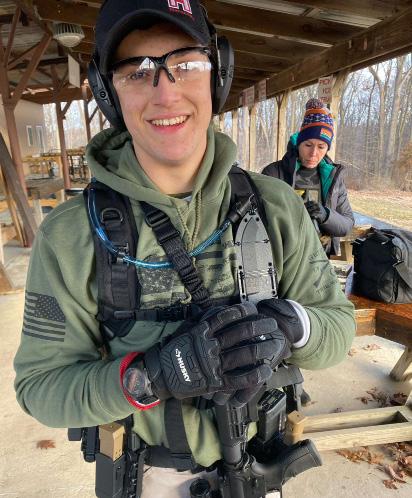
For an average high school student, these interests aren’t common.
Ronon isn’t an average high school student.
Whether you’re receiving a passionate
read about the 1964 Los Angeles County Museum of Art postpainterly abstraction exhibition. I read about the 1999 Brooklyn Museum of Art Sensation exhibition. I read about Robert Morris’s 1980 exhibition at the Museum of Modern Art,” Sixth Former Tripp Ronon said. “[Los Angeles] is the center of the art world.”

argument about critical theory or scrolling through his weirdly artistic “post-minimalism” Instagram account, Ronon is known for his uniqueness.
His eccentric energy will leave the Main Line soon, as he prepares to join Occidental College’s Class of 2028. He will move to Los Angeles in August to stay for the next four years.
Ronon stands out amongst his peers, even in the college process. Confident in his fit for Occidental, it was the only school Tripp applied to for early admissions.
“Part of that decision [to apply to only Occidental] was knowing that he was an incredibly good t for that school.”
DR. MICAH DEL ROSARIO
“I wanted a small liberal arts college in an urban location, which is a tough ask,” Ronon said.
Upper School English teacher Dr. Micah Del Rosario agreed.
“Part of that decision [to apply to only Occidental] was knowing that he was an incredibly good fit for that school,” he said.
Planning to major in Critical Theory & Social Justice, Ronon plans to be a part of Los Angeles’ union culture.
“I could read Angela Davis’ feminist critical theory,” he said. “There is no excuse for me to be reading critical theory, and not go out and do something about it.”
Ronon isn’t interested in West Coast hobbies, opting to lean fully into the union culture.
“I’m not going to Los Angeles for the skateboarding or surfing,” Ronon said. “I’m going for the contemporary art and the organized labor.”
While away, Ronon won’t leave Haverford completely behind.
Along with potential visits during the holidays, he’ll keep close with his friends and teachers. “[Sixth Form Russell Yoh and I] have this agreement that when I go to New York, I’ll be with him. And when he goes to LA, he’ll be with me,” Ronon said.
“I’ve never been to LA,” Yoh said, “but I’m definitely going to go visit. [He’s] giving me a reason to go.”
Dr. Del Rosario leaves Ronon with a piece of advice
“Try to immerse yourself in the city. Try to get a sense of the life in your community outside of the geographic boundaries of your university,” Dr. Del Rosario said. “Lean into the experience of having a complete life reset.”
Tanner Vogel ’24 in his competition gear A’mir Ibrahim ’24History Teacher Mr. Timothy Lengel’s Sixth Form Government & Politics elective spends a lot of time discussing the importance of civic engagement. This year, an election year, the class did more than just talk about it.
For their culminating project, Mr. Lengel tasked students in the course with running a voter registration drive for the Class of 2024.
“The point of the Government & Politics senior elective is to prepare young men to become voters, so this seemed like an appropriate project,” Mr. Lengel said.
Students in the class had big incentives for success. First, Mr. Lengel informed them that their final grade on the project would be equal to the percentage of eligible Class of 2024 students they registered. Second, the class had the opportunity to earn recognition for the school with a Governor’s Civic Engagement Award.
The Governor’s Civic Engagement Award is presented by the Pennsylvania Departments of State and Education. The award recognizes and celebrates the efforts of Pennsylvania high school students “to educate, engage and inform their fellow students about how to get involved in the voting process.”
To earn a Gold Level School award,
“One of the problems we have as a democracy is that, unlike many other countries, the United States makes it realtively di cult to vote.”
MR. TIMOTHY LENGEL

high school students must organize a voter registration drive in their school and register at least 85% of eligible voters.
97.4% of the Class of 2024 are now registered to vote.
Statistics on voter registration are bleak. According to PoliticsPA, at the close of 2023, 18-24 year olds represented the smallest percentage of registered voters in Pennsylvania.
The Civics Center reports that, as of January 2024, only 26% of 18-year-olds in the greater Philadelphia area were registered to vote. Older residents are registered at a rate of 80%.
“One of the problems we have as a democracy is that, unlike many other countries, the United States makes it relatively
difficult to register to vote,” Mr. Lengel said. “It is time-consuming and a little bit annoying, which is a barrier.”
According to research by Tufts Univer-
e Haverford Class of 2024 is the rst class at Haverford to be recognized with a Gold Level School award.
sity’s Center for Information and Research on Civic Learning and Engagement only
“STEAM Day” is an event organized by science and math teacher Ms. Alexandra Surdel and biology teacher Mrs. Tashia Lewis designed to have Upper School students inspire younger students’ interest and excitement in the fields of science, technology, engineering, arts, and mathematics.
The day consists of lower and middle school students visiting the Upper School to learn about STEM subjects and the arts.
STEAM Day transformed the community room. Different classes set up presentations about high school topics like calculus and chemistry. Presentations comprised a variety of topics: roasting marshmallows with light, calculating the volume of balloons, and more. The day consisted of four blocks of 75-minute sessions.
During each session, lower and middle school students visit all the stations for 30 minutes at a time, interacting with upper school students. For many students in STEAM classes, this was seen as the culmination of everything they had learned in their respective courses. STEAM day was a day of
learning, academic discussion, and a method for students to showcase their talents.
According to math teacher Mr. Jeremy Fus, “STEAM day was a great experience for the middle and lower school students to learn from upper school students, and it was a good way for upper school students to engage with the community.”
Mr. Fus’s Honors Calculus class was tasked with describing topics at three different levels, similar to the 5 levels of explanation series by WIRED. Using this method, lower schoolers were able to unpack and understand complex mathematical topics such as differentiation and integration. Teaching lower and middle school students about these topics helped reinforce understanding while studying for final exams. Another benefit of STEAM day is the mix between upper and lower school students, fostering brotherhood in the classroom.
STEAM Day is a great example of how Haverford’s inspires and motivates younger students.
39% of young adults are confident in their knowledge of how to register to vote. Moreover, disillusionment with the political system, skepticism about the efficacy of voting and barriers to registering discourage youth participation.
The Government & Politics students set up voter registration tables in school and worked one-on-one with their classmates to walk them through the registration process.
The Governor’s Civic Engagement Award program has been recognizing Pennsylvania High Schools since 2017. The Haverford Class of 2024 is the first class at Haverford to be recognized with a Gold Level School award.
 Jonny Wang ’26
Connor Simpkins ’25
IAN ROSENZWEIG ‘25
Donald Trump (R) and Joe Biden (D) will again face off in the 2024 election
EMMA KADEN VIA WIKIPEDIA COMMONS
A first grade student throws a water balloon as part of Mr. Fus’s Calculus class’s STEAM Day activity
Jonny Wang ’26
Connor Simpkins ’25
IAN ROSENZWEIG ‘25
Donald Trump (R) and Joe Biden (D) will again face off in the 2024 election
EMMA KADEN VIA WIKIPEDIA COMMONS
A first grade student throws a water balloon as part of Mr. Fus’s Calculus class’s STEAM Day activity
Joshua wakes up at 5:30 a.m. to the sound of a running subway. His hands and legs ache from his heroin ulcers, a product of 18 years of addiction. His back aches from the uncomfortable bench bars; he is used to both.
There aren’t any other clothes to change into.
He walks past the morning foot traffic to the Wawa on 6th and Chestnut Street. The workers know him, so his coffee is free. When the workers aren’t looking, his breakfast sandwich is also free.
He enjoys his coffee, sandwich, and cigarette as he walks four blocks up to 10th Street for his methadone treatment.
“It’s like a safer form of [heroin],” he says. “[But] you’re not getting high on it.”
Whatever withdrawals he still has, he makes up for with a hit of heroin later. He receives one-on-one counseling twice a week, but today is not one of those days.
With the extra time, he relaxes in the Starbucks on the same block. He plugs in his free, welfare-provided phone and opens Facebook to watch his favorite anime, One Piece. He’s on episode 1065, but his excitement about Luffy’s rematch with Rob Lucci brought him to YouTube for intentional spoilers. When he’s done with One Piece, he plays Monopoly Go! Or Animal Crossing: Pocket Camp.

The average passerby walking through Rittenhouse Square on a Sunday or Wednesday will see more than a dozen people lined up on a wall with chess boards. To the passersby, it’s random; to chess players, it’s a community.
e rst player who arrives grabs and sets up the board, and the last player to leave returns them to the Ethical Society.
“It’s just like a really nice place to come and kind of decompress and socialize and meet people,” long-time member Will Auerbacher says.
To many, chess is a lonely game, with
Then he panhandles on the street. He usually sits in front of the GIANT heirloom market on 8th and Market Street. He isn’t allowed in there since he was caught stealing food, but a few kind passers-by purchase a snack for him or hand him some cash.
On an average day, he makes about 20 to 30 dollars. “Food and cigarettes. That’s the end of it… [the drugs] are usually free,” Joshua says.
Other passersby aren’t as kind. “I was sitting here with my sign, and a f*cking dude came by and kicked it off my foot. ‘Go get a f*cking job,’ [he said]. I said, ‘If I wasn’t f*cking injured, I would…’ It’s not that I don’t want to work. It’s that I can’t use my hands.” These alterations are common for Joshua. “A lot of people nowadays grew up with a silver spoon in their mouth. They haven’t known what it’s like to struggle.”
It’s late in the afternoon, and the drugs are his next destination. He hops on the Market Frankford Line to Kensington for his daily dosage. He knows the dealers, so the drugs are free. Sometimes, though, they cost a favor. “Like standing at the corner, letting them know if cops are coming… then I could choose if I want them to pay me in cash or drugs… I usually choose half and half.”
Joshua isn’t alone. In 2022, Philadelphia had a total of 1,413 overdose deaths, along with many more Philadelphians abusing illicit drugs. The majority of these deaths include fentanyl, a highly potent opioid that is sometimes added to heroin. The drug problem is common with Philadelphia’s homeless population, with 83% of homeless Philadelphians abusing or depending on drugs or alcohol.
It’s about 6 p.m., so Josh returns to Center City to be a doorman at Wawa for extra change. After about an hour, he orders his go-to meatball sub and gets ready to find a subway station for the night. When he finds one, he waits until the SEPTA worker leaves, and hops the turnstile to find a bench.
“Josh is a good man, just like everybody else is a good man,” Rodney says, a recovering addict currently staying in a recovery home. “I can’t judge none of these guys because I’ve been there with them.”
According to Rodney, addiction starts from home. “If you don’t have a good foundation in the home when you step out that door, there’s a whole world out there.”
Joshua lacked that foundation. His parents often enabled his addiction, and his mother used drugs in front of him. His mother was a nurse who worked with cancer patients. Josh’s father was a mechanic and owned a pizza shop. After suffering from injuries, both were prescribed OxyContin as a painkiller, and their addiction grew from there.
Joshua suffered a similar fate after breaking his knee skateboarding.
With progressively stronger doses of Percocets followed by an abrupt cutoff, Josh realized that he was hooked on them and started buying them from the street.
“[My parents] were drug addicts. So they understood how it was like when you don’t have it, the sickness comes on. They knew how it felt, and so they didn’t want me to feel like it… Growing up watching them do it was one thing, but then getting older and then having them give it to me, that’s a whole other thing.”

most players spending time alone to study and analyze the game or play online. Rittenhouse Chess offers a social aspect to the game, creating a community with chess players of all skill levels.
Originally, the group was created in 2021 by Andrew Graham, a Philadelphia data scientist. Post-COVID-19, Rittenhouse Chess was the community many Philadelphians needed, and the group quickly became popular. Currently, their Facebook page hosts 914 members.
The easily accessible Center City location, organized times, and public setting allow many people to join easily. One of these
people is Jason Carrete, a first-time Rittenhouse Chess member who recently moved to Philadelphia.
“I never did anything like this in Jersey. I was very much inside most of the time,” Carrete says. “I moved to Philly… [and] I was like, we’re going to make some changes.” Carrete works at the Comcast building, only a ten-minute walk from Rittenhouse Square. Wednesday at 6 p.m., after work, Jason decided to stop by and play a few games. He enjoyed the scenery, street music, and conversation with his opponents, deciding to return for another visit.
Group administrators sometimes host
tournaments and other special events. The twice-a-week meetings, however, are mostly self-run. Boards are borrowed from the Philadelphia Ethical Society across the street.
The first player who arrives grabs and sets up the boards, and the last player to leave returns them to the Ethical Society. Most days, Jordan Feller, who also works at Comcast, does both. Although he isn’t an administrator, he has been a regular member for the last year.
“[There’s] no money involved,” Feller says. “[We are] slowly learning without feeling pressured because it’s a pretty chill environment.”
A’MIR IBRAHIM ’24 Joshua Peters shows off his ta oo A’mir Ibrahim ’24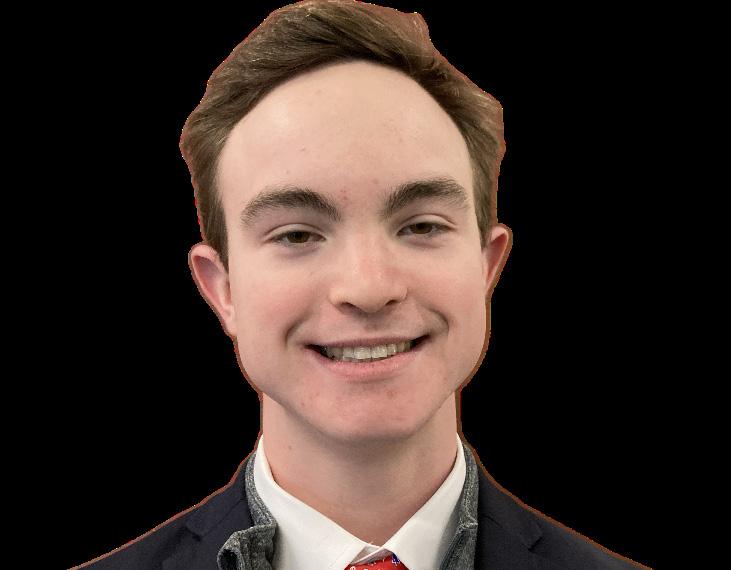
Peter McConnell ’26
After a long year of studying, the last thing many students looked forward to was finals. Ideally students would spend Memorial Day weekend relaxing, looking back on all the accomplishments made this year. Leading up to exams, the thought of not having the weekend spent relaxing was frustrating..
Final exams week felt new this year, but historically, Haverford has always had exams.
“Prior to COVID, exams always existed after Memorial Day Weekend. There seems to be no way to have them before Memorial Day,” said Head of the Upper School Mr. Mark Fifer.
Mr. Fifer explains this is due to when commencement falls. According to Mr. Fifer, commencement typically falls two weeks after Memorial Day Weekend. Since the school year cannot end mid-May, it isn’t justifiable to “stop classes… in order to run exams prior to Memorial Day,” Mr. Fifer said.
Another scheduling challenge is what to do with the weeks after Memorial Day.
“We would have a two-week block after Memorial Day that we… wouldn’t know what to do with. Ultimately, we wanted to protect class time,” Mr. Fifer said.
It raises the question, is it possible to have IC Day, along with other “fun” activities pushed to after Memorial Day?
According to Mr. Fifer, “some schools do exams before… and then run the equivalent of an experiential education program after Memorial Day.” But that model would
Ajay Chakraborty ’26
Students line the halls, computers open, reviewing the material they learned across the entire second semester. This is what finals week looks like.
This year, the school has implemented a five-day exam period. From May 29 to June 4, students take exams across English, math, history, science, language, art, and other electives.
This raises the question: is finals week a positive thing? Is it good to stress students out and risk tanking grades all to have a cumulative exam on material in the second semester?
One of the biggest drawbacks of an exam period is the stress it causes students. Stress, often called a silent killer, is a large problem for today’s youth.
Stress can be bad for health, and it is important to minimize it. It spikes cortisol, which has many long-term effects.
According to the Cleveland Clinic, “having oo much cortisol in your blood can lead to inflammation, a weakened immune system, and unbalanced hormones.”
However, this stress is over a relatively short period, minimizing the risk of any problems.
One could argue that since universities and other schools have exam periods similar to what we have this year, we are prepared for future education.
One of the biggest factors in debating finals week is the fact that it can make or break a student’s grade.
If students were diligent about getting
raise new challenges for the school.
“We don’t necessarily have the infrastructure right now to be able to do that because the IC Day we have is a one-day experience, and so moving to an experiential education program that would be multiple days…would require a significant institutional commitment…financially… [and] we would be reducing the number of class days,” Mr. Fifer said.
“We built in two days of review [for exams]. The issue with this is timing the review days around Memorial Day,” Mr. Fifer said. “Placing these review days adjacent to Memorial Day makes it tough.”
However, families go away for Memorial Day, and some students don’t make it to these important review days. Attendance challenges arose “even when it was a regular school day because many students left,” Mr. Fifer said.
It seems as if there could be some potential investigation into these days. Mr. Fifer notes that the school has statistics on attendance and it is something the school will be looking at.
Mr. Fifer laments, “it’s a funky time… the end of the school year being around Memorial Day and where our graduation falls, June 7th.”
“Trying to get exams in, also provide as much contact time with classes as possible and then account for the holiday weekend,” is quite a task, Mr. Fifer said.
Ultimately, if possible in the future,
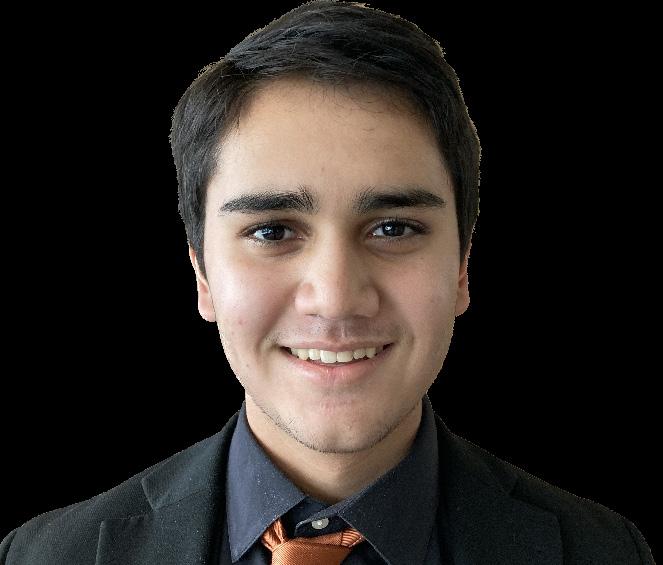
work in, studying for tests, and understanding the material, they would likely have a good grade going into the exam.
However, if they had an off day on the day of the exam or ran out of time on the exam, it would be detrimental to the grades they worked so hard for.
Also, if they did not have a superb retention of material, it would be more difficult for them to do well on the exam.
However, it also works the other way. If they did not put in the work throughout the semester, but they took the time during the exam period, they would likely have a significant boost to their grade.
People shouldn’t be defined by their mistakes, and finals week gives students who made mistakes academically a chance to redeem themselves.
In terms of a learning perspective, an exam period seems positive. It forces students to relearn material, which allows them to retain more of what they learned.
It ensures that students review material
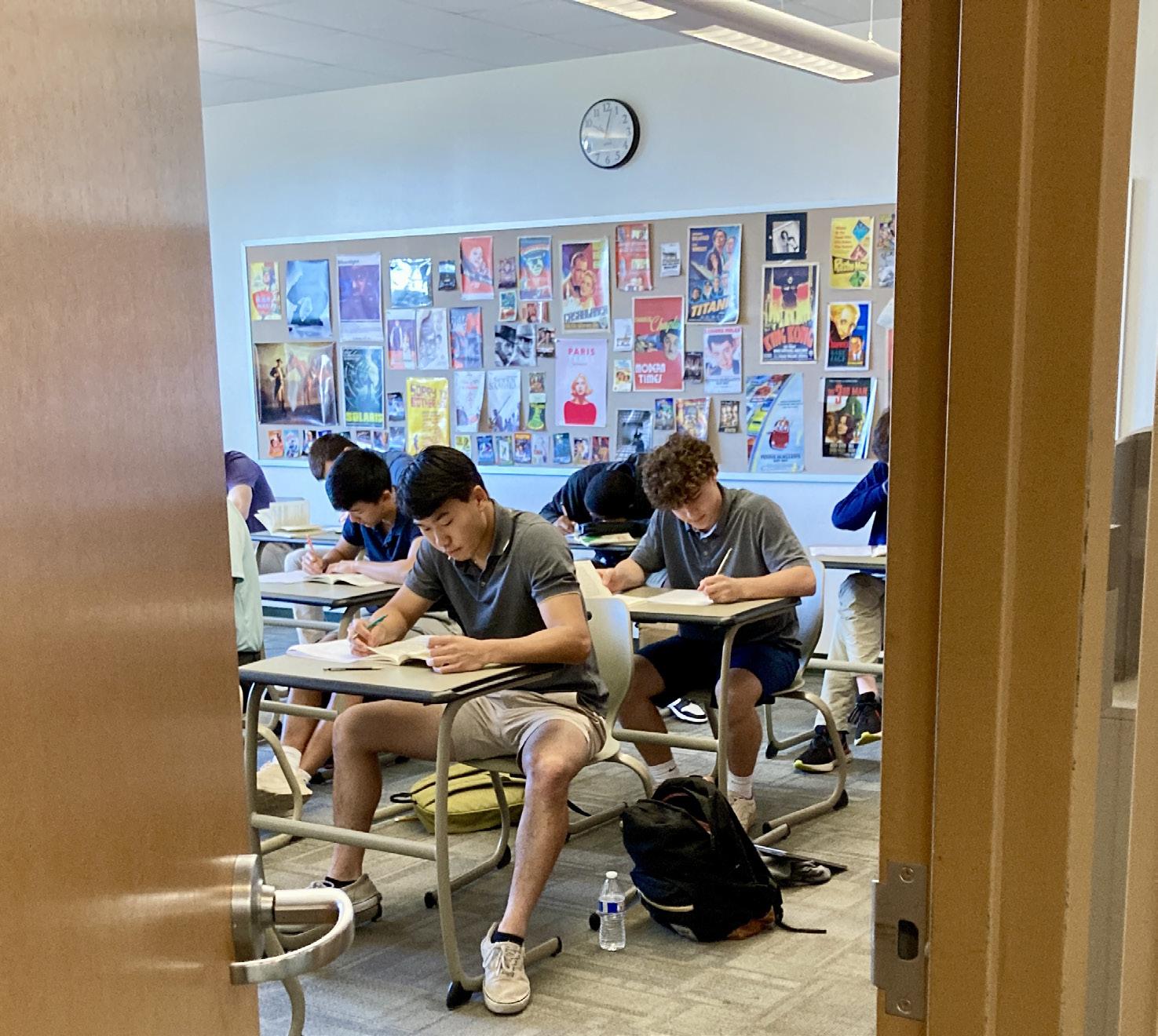
the best use of finals week is before Memorial Day, giving students the opportunity to enjoy their weekend looking back at their accomplishments, all the while looking forward to the opportunity to learn in an experiential way.
While it might be a tall task financially and logistically, exams prior to Memorial Day is certainly something worth investigating.
that they may have forgotten after they finish the respective unit. If this material is used in future courses, students must remember more of the information.
Fourth Former Avery Paul said, “I personally don’t like having finals. I always am concerned about my tests, and I find it very difficult to enjoy life during this time.”
Many agree with Paul. They see finals as
something extremely negative for their lives and for the community. However, others think it is important.
“It allows me to remember and relearn things that I otherwise would have forgotten,” Fourth Former Joseph Kahana said. “It also gives me more control over my grades in the final stretch.”
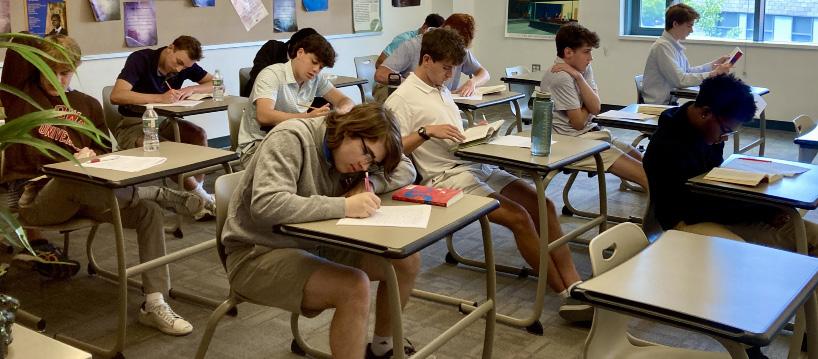 English III students working on their exams
English III students working on their exams
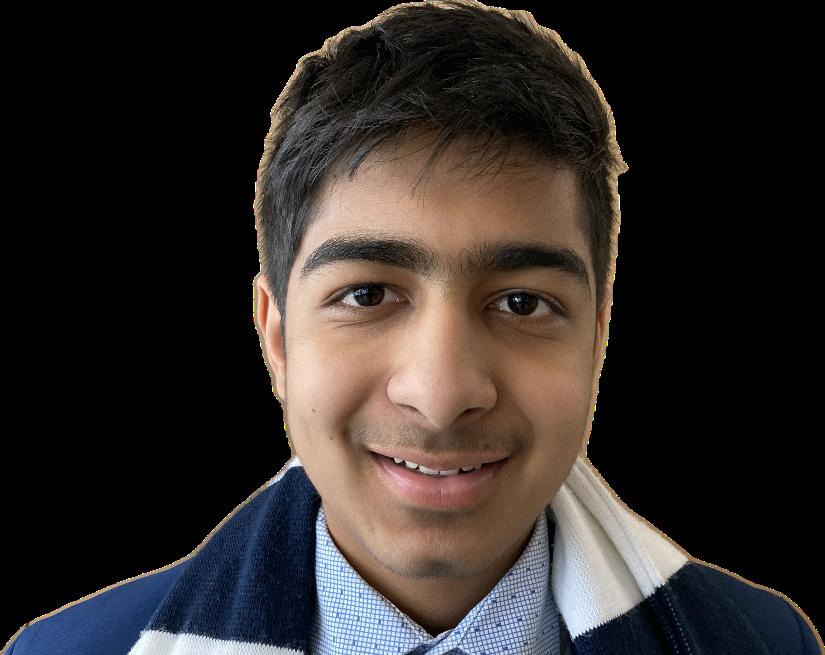
This summer is set to be the hottest summer in two thousand years. This shows global warming is still at large. Greenhouse gases, while invisible, still affect everyday life in a big way. Not only do these greenhouse gasses affect environments all around the world, they also affect schools.
A study by the Harvard Kennedy School shows each degree of heat reduces how much the students have learned in the year. This study took data from 10 million PSAT participants.
Another Harvard study shows that test scores taken on a 72-degree day are much better than test scores taken on a 90-degree day. This study also tells us that extreme heat affects mathematics three times more than it affects English or Language Arts.
Lastly, climate change affects sleep. Sleep is crucial when it comes to taking tests, and is especially important in the lives of young boys. It is imperative to use this summer to get much-needed rest, to set students up for success.
Schools around the country, Haverford included, can take actions to support students in this unprecedented time in their lives. Schools can use the summer to upgrade their air conditioning. Also, schools should also have the student opinions in mind when setting the air conditioning. A possible email every month asking the students whether the temperature is comfortable would be a great start.
Nonetheless, Haverford provides an environment where the students can succeed. Studies also show that heat does not affect students in the summer nearly as much as it does in the school year. However, the heat during the summer will be a factor in completing summer work.
However, it is important to be diligent and act accordingly with the environment students will be working in. In addition, as
record heat this summer reminds us to take care of the

Surface air temperature change over the past 50 years
Fords, it is our responsibility to fight and tackle problems in the world. It’s never too early to start.
Students and teachers should set aside extra time to prepare for the school year next year because of the learning curve heat imposes. For the health of our students and
peers, the school should also be careful if more wildfires are a health problem. In June, 2023, the Canadian wildfires made the sky orange, and brought a big health problem. Being outside for more than one hour at the time of those wildfires could cause serious damage to your wellbeing.
Global warming is just one of the problems facing our generation. Throughout the summer, make sure to throw out all your trash, use energy wisely, and be mindful of how you are treating the planet.
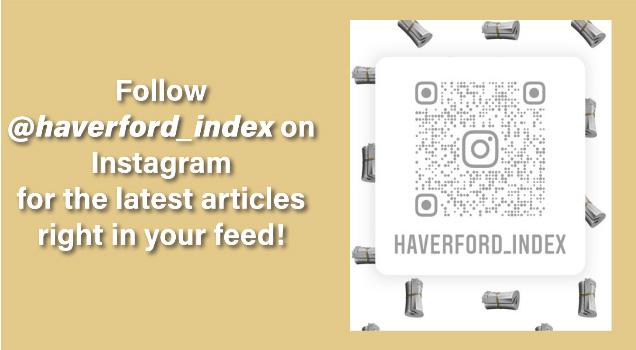
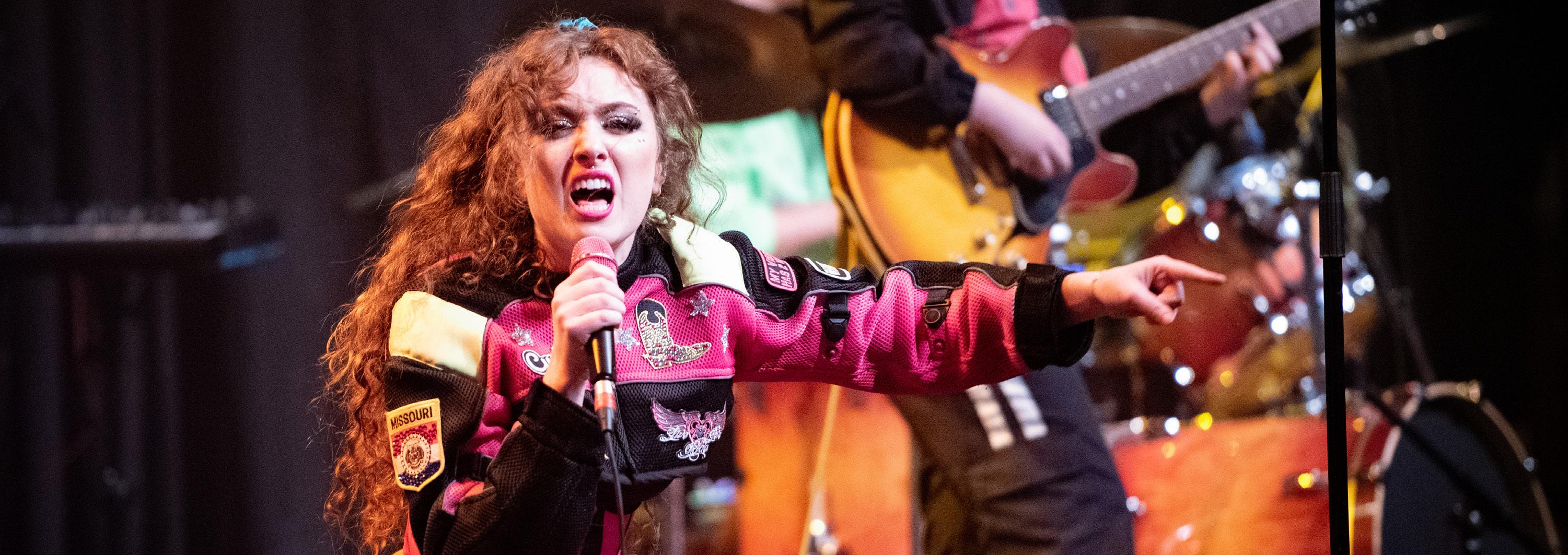
Where were you when you first heard “Casual” by Chappell Roan? In your car on the way to a miscellaneous appointment? Sitting on the train listening to music with your corded headphones?
Maybe you were me, sitting at my desk sophomore year, struggling to finish my abysmally contrived Chemistry* OneNote. Or maybe you’re reading it for the first time here in this article. Regardless, her explicit sexuality immediately stands out, expressed freely in all her music.
From dancing “Naked in Manhattan” to performing at the “Pink Pony Club,” Chappell Roan’s explicitly queer music represents what it’s like living as a queer person amidst the backdrop of “traditional family values” of small-town America.
Born Kayleigh Rose Amstutz in a trailer park in Willard, Missouri, Chappell Roan always craved something greater than her small town but also held a sense of pride regarding it. Throughout her youth, Amstutz yearned for the vibrance of a big city like LA or New York, and as a closeted queer girl growing up in the heterosexual norms of small-town Missouri, she too yearned for the freedom LA would provide for her.
In her 2020 single “Pink Pony Club,” Roan sings that she’s “having wicked dreams /Of leaving Tennessee /Hear Santa Monica /I swear it’s calling me” and feels compelled to dance at a “special place /Where boys and girls can all be queens every single day.” This bubbly ballad was inspired by a strip club in her hometown as well as Santa Monica drag culture.
Because of the pandemic, the single didn’t perform nearly as well as one would imagine, and she was dropped from her label for her “poor” performance. While quarantining in Missouri, Roan released the synth Balad “California,” a reflection on her disappointment.
In the lines “to think I almost had it going /But I let you down,” Roan feels as though she’s let down her parents and her town, losing her one chance at fame and making her parents proud. She reflects upon the stark contrast between Missouri and California, “Come get me out of California /No leaves are brown /I miss the seasons in Missouri /My dying town.”
She relates the natural fall from her record label to the brown leaves that fall from a tree in autumn. Like a dying leaf, her voice falls in a descending melody, an example of word painting used when singing the words
“brown,” “dying,” and “down.” This song encapsulates Roan’s desire to leave California and return home.
Roan’s career didn’t abruptly end after moving out to California. She took a year off and later released “Casual, Red Wine Supernova,” and “HOT TO GO!,” singles that would become popular on TikTok, with “HOT TO GO!” ’s chorus accompanied by its very own dance and a spunky a cappella performance by the Williams College Euphoria.
Roan’s debut album, The Rise and Fall of a Midwest Princess, pays homage to her roots with an album cover invoking images of drag and pageantry. When describing the inspiration for the album title, she explains, “I got a tramp stamp that says princess, and I was like, oh my god, it all makes sense, like… this works.”
While family and friends from her conservative past may frown upon it, Roan’s unfiltered, sexually explicit music has attracted a large, majority queer fanbase that attests self-liberation requires rebelling against the cultural norms one grows up in.
Kayleigh Amstutz’s character of the trailer park pop princess shatters many heterosexual cultural norms as well as queer norms: She’s a woman who does drag. Her alter ego of “Chappell Roan” is described as a “Drag Diva that embodies Kayleigh on stage.” The drag energy gives her confidence that allows her to tackle large sets like Coachella and even open for Olivia Rodrigo.
On tour, Roan opens her shows with a local drag performer from each local queer community. In her own hometown concert, she recalls looking out into the crowd and thinking that she’d recognize everybody in the audience, but “I hardly saw anyone in the crowd I knew.” This revelation made her wonder, “Where were all these gay people? Were they hiding?” She continues, “The fear of me not belonging was broken by knowing that there are so many queer people here.”
It’s comforting to one’s inner child that they were never alone after all. In the end, Chappell Roan is doing this for her and to reinvent herself. On stage, she wears jewelry from Claire’s and the cowboy boots she would’ve worn at thirteen years old on a Friday night out with her family. Roan reflects, “I wanted to honor that part of myself here.” She makes the music she would have wanted to hear as a kid. Her newest single, “Good Luck, Babe!” takes on compulsory heterosexuality in a sapphic relationship and is on track to become her first top-40 hit.
 Chappell Roan leads a new generation of pop music and brings with it a movement of queer revelry; she proclaims, “You’d have to stop the world just to stop the feeling.”
Chappell Roan performs in Indianapolis in 2022
JASON MARTIN VIA WIKIMEDIA COMMONS
Chappell Roan leads a new generation of pop music and brings with it a movement of queer revelry; she proclaims, “You’d have to stop the world just to stop the feeling.”
Chappell Roan performs in Indianapolis in 2022
JASON MARTIN VIA WIKIMEDIA COMMONS
“We were surprised by how good we were as a team,” Sixth Form tennis team captain Arsh Aggarwal said.
For the first time in over a decade, the tennis team went undefeated for the entire regular season with a record of 18-0—the only team in the state to do so. They took down every team in the Inter-Ac twice with ease, to claim the Inter-Ac championship for the fourteenth year in a row. The team defeated Conestoga High School, the Pennsylvania state champions for the last two years, 5-2. The netmen finished with a record of 20-1, only losing to Germantown Friends School in the season’s final match.
Aggarwal found that focus allowed for the team’s success.
“If I had to attribute this year’s success to anything, it would be our level of focus throughout the year for every single match,” Aggarwal said.
Fourth Former Kaiser Zhao said, “We always fought for the last ball, and every single person on the court wanted it. Our team chemistry allowed for this.”
Fourth Former Max Olson had similar thoughts. “The team this year was the most connected team I’ve ever been a part of,” Olson said. “This was a big reason we were so successful this year.”
“In my four years on the Haverford varsity tennis team, I’ve never experienced a team environment as determined to win and succeed as this year’s team,” Aggarwal said.
These qualities did wonders during the season, especially in their match against Conestoga.
“Every single match could have gone either way. Their players were as strong as ours, but we wanted it more that day,” Olson said. “We set the tone from the start and [we] beat them badly, 5-2.”
The win against Conestoga was the most significant victory for the team. “It was the highlight of the season,” Aggarwal said.
Olson recognized that the team’s continuous success eventually hurt them in the final match. “Winning eventually became viewed as a right the team had rather than
a reward. I don’t think we were as prepared as we could have been going into the state finals against Germantown Friends.”
The match had to be played indoors, which most players on the team were not experienced with, unlike those from Germantown Friends.
“It was a well-fought match. However, they wanted it more than us that day,” Zhao said.
Olson said, “It only came down to a few key points where they outplayed us. The matches could’ve gone either way. However, I can comfortably say that each team member gave their 100% effort that day though. Every team has that moment where they get outplayed, and it unfortunately happened to us at an abysmal time.”
Under Aggarwal’s leadership, the tennis team has kept its head up for the next season.
“One loss doesn’t define our season,” Aggarwal repeatedly told the team.
Despite the loss, the team’s season was still remarkable. The future looks even brighter.
“The rising juniors and seniors are all strong leaders and have shown incredible dedication to the team, making it extremely difficult to figure out team captains for next year. Our two best players are both currently sophomores, too,” Aggarwal said. “It’s funny to say after seeing how successful we were this season, but the 2023-2024 will be the worst the team is for the next two years.”
Aggarwal and Sixth Former Graeme Herbert are the only graduating members of this year’s starting lineup. This number is low compared to other teams in the Inter-Ac.
“With such a young core, the team will only do better in the following years,” Olson said.
“I expect us to bring home a state championship, more Inter-Ac titles, and to make a name for Haverford tennis and set the bar for the future,” Zhao shared.
Zhao also believes the team can make it past the state level. “We have a very young and deep roster that can develop into a national-level team.”
Expect the tennis team to flourish as the current players continue to improve. The
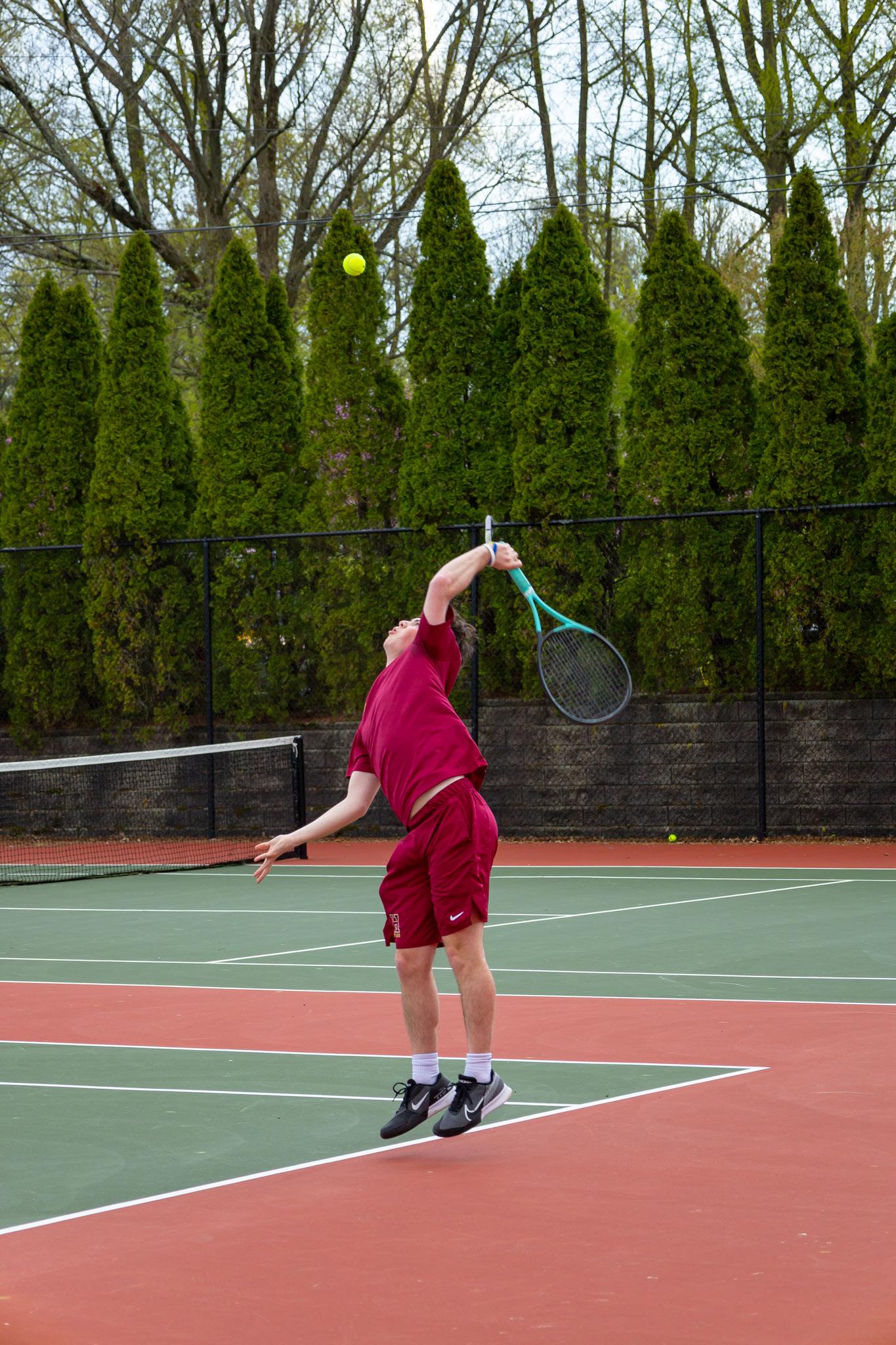
team has the potential to do something extraordinary.
“We’re hungry for another shot to be
The school year has ended, and so has the spring sports season.
As always, the lacrosse team was a dominant force, earning the right to be called the back-to-back undefeated Inter-Ac champion.
As the team reflects on its season of triumphs and camaraderie, their dedication and unity shine through in every game. The team spent hours on both ends of the field, day and night, working to get to where they are now. Like the adage “iron sharpens iron,” the high-intensity reps of offense versus defense proved helpful in the end-game, as the team was nearly impeccable in each performance.
“ e team put in a lot of hard work, and through that hard work we all got better and bonded.”
KELLEN GARDNER ’25
“The team put in a lot of hard work, and through that hard work we all got better and bonded as a team, which in turn made us comfortable to play in those high-stakes games,” said Fifth Form defenseman Kellen Gardner. “It’s exciting, thinking about being a freshman, new to the school, and just like that I’m stepping into the seniors’ role. It’s crazy how fast it went by, but it is also exciting knowing that not just me, but everyone else in the [junior] class on the team, gets to step into a similar role.”
Gardner also recently received the honor of wearing #10 for both the football and lacrosse teams in memory of Kip Taviano ’13. “Kip-Tav, it means a lot. It’s a huge honor, and that every time you put on a Haverford jersey, it’s bigger than yourself because you playing for all the alumni and all those that came before you, and being able to wear #10 and play for Kip, it’s a lot more. Watching all the guys who came before me were great leaders—it makes me excited,” Gardner said.
Gardner, who will attend Notre Dame in the fall of 2025, was one of three Fifth Form defenders—joined by Duke recruit Gavin Cooper and University of Pennsylva-
nia recruit Charlie Halpert—who stepped up this year, creating an impenetrable wall around the net. The team’s defense helped it stay in games when things got streaky and will be a key piece moving forward into next season.
“Good communication is the most important part of a good defense.”
COACH BRENDAN DAWSONNo defense is complete without a goalie, however, and when injuries arose, Sixth Former Brody Murphy was ready to step up. The goalie has been a critical reason that the team posted an undefeated Inter-Ac record each of the last two seasons. He averaged nearly ten saves per game this season, with a save percentage close to .600.
“Good communication is the most important part of a defense,” Murphy said.
“Without talking to each other, no one would know what was going on, and everyone would be confused, and it would be a lot harder to play good defense.”
Head coach and assistant athletic director Brendan Dawson said, “The best part of Brody’s game, from my perspective, is his poise. He never gets rattled and is always in the moment. It’s been a pleasure to coach him.”
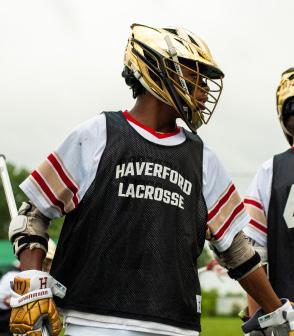 the state champions next year and will give everything to do so,” Olson said.
Quinn Sullivan ’25
the state champions next year and will give everything to do so,” Olson said.
Quinn Sullivan ’25
In late May, the crew team closed out their championship season with dominant performances in two of the largest high school regattas in the nation, the Stotesbury Cup (Stotes) and the Scholastic Rowing Association of America Nationals (SRAA). For the athletes on the team, the last few weeks of the spring season are filled with hard training.
“There’s about five weeks of non-stop, competitive racing which is the peak of our season,” Sixth Former Ryan Brewington said. “Prepping for Stotes and SRAAs is always a hard grind of just constant workouts and practice.”
Third Former Benas Antanavicius believes that mental preparation is the way to overcome stressful regattas. “The best way to prepare for championship races is just to be confident,” he said. “If you believe that your boat is there to win, then it can take a lot of the stress and franticness you might have during the race.”
At Stotes, the team won gold in the Boys Varsity Lightweight Double (Sixth Formers Ethan Lee and Casey Williams) and in the Boys Second Four (Sixth Former Quintin Bowers, Fifth Former Grey Benson, Sixth Former Lowen Etherington, Sixth Former Daniel Belden, and Fifth Former Miguel Duska). They also claimed bronze in the Boys Varsity Senior Four (Sixth Former William Walker, Fifth Former Michael Bartholdson, Sixth Former Lucas Putter, and Sixth Former Jackson Harrington) and Boys Varsity Senior Quad (Fourth Former Brooks Brewington, Fifth Former Ben Erskine, Fifth Former Noah Kanefsky, and Sixth Former Ryan Brewington).
“It was a really neat experience win-
ning Stotes again,” Lee said. “The trophy for our event is called the Barker Trophy, and Coach Barker was a really influential figure in Haverford crew history, so to win a trophy named after him is always a big deal at the boathouse.”
Less than a week later, the team sent five boats to SRAAs and brought home two national championships in the Junior Varsity Quad (Fourth Former Brooks Brewington, Fourth Former Henry Biddison, Third Former Benas Antanavicius, and Fifth Former Charlie Gord) and the Boys Varsity Four (Sixth Former William Walker, Fifth Former Michael Bartholdson, Sixth Former Lucas Putter, and Sixth Former Jackson Harrington). The Boys Varsity Lightweight Double and the Boys Varsity Quad (Fifth Former Ben Erskine, Sixth Former Joseph Herd, Fifth Former Noah Kanefsky, and Sixth Former Ryan Brewington) took home bronze.
“I think what made [The JV Quad] successful at SRAAs was our ability to adapt,” Antanavicius said. “We changed boat lineups three days before going to nationals.”
Antanavicius also believes that their success was augmented by their ability to focus on themselves.
“We really focused on rowing our race. We just had to focus on ourselves and believe that if we fell behind, we could definitely come back,” Antanavicius said.
The Varsity Four also bounced back from their bronze performance at Stotes to a gold medal at SRAAs. Their loss at Stotes motivated them.
“The boat that beat us at Stotesbury was the boat we knew we were racing, so the entire weekend we were focused on catching
them,” Bartholdson said. “Going into the sprint of the final, we were up about half a boat length and they walked it back to about even. Without saying anything, we all knew we had to get in front.”
For Kanefsky, winning bronze in the Varsity Quad was disappointing. However, he is more motivated than ever.
“The Haverford juniors and underclassmen are excited to bounce back,” Kanefsky said. “As of now, five out of Haverford’s six fastest guys are all juniors. This means we’re going into the next season just as fast, if not faster, than any other year.”
The team is looking forward to continuing their dominant performances over the past few years.
“The best way for the current juniors to continue the legacy of high performance in Haverford Crew is to lead by example,”
Kanefsky said. “Passion is contagious with Haverford Crew. Coming in day after day and watching seniors be passionate and work with intensity will undoubtedly motivate anyone who wants to work.”
Antanvicius is looking forward to meeting and exceeding expectations.
“As a team, I think we have a good chance at winning even more at SRAAs next year. A lot of the team is doing summer programs, so we’ll all be getting better constantly year-round,” he said. “In terms of the freshman team, I think we all have a lot of potential.”
Brewington agrees.
“I hope the underclassmen and juniors exceed [the Class of 2024’s] achievements next year and beyond,” Brewington said. “We’ve set the bar high.”
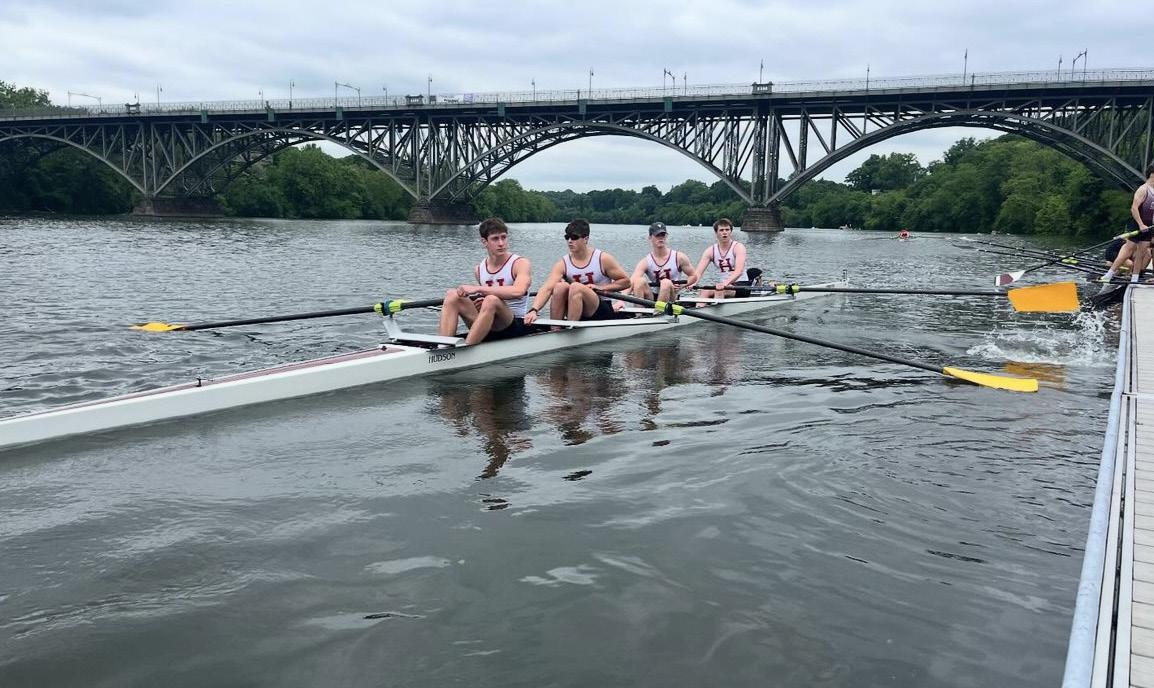
Though ultimately falling just short of the team’s objective of winning a state championship, the baseball team had an incredibly impressive year. Throughout the season, the team and the players achieved many significant milestones. Sixth Form pitcher Ian White captured two-hundred career strikeouts, and fellow Sixth Form pitcher Kevin Reavey captured one-hundred career strikeouts. The Fords also beat the state champions Malvern Prep, 2-1.
Another impressive achievement was Head Coach Bob Castell’s 500th career win as the head coach.
The Fords had the momentum, experience, and talent heading into the semifinal game against Perkiomen on May 23rd.
Unfortunately, Perkimon drafted the Fords and ended their season, sending Perkiomen to the state championship against Malvern Prep.
“It was brutal to lose like that, especially with how we had been playing,” Fifth Former Brenner Green said. “I know we would have loved to have a shot at Malvern.”
The team showed earlier in the season that they could beat anybody in the state,

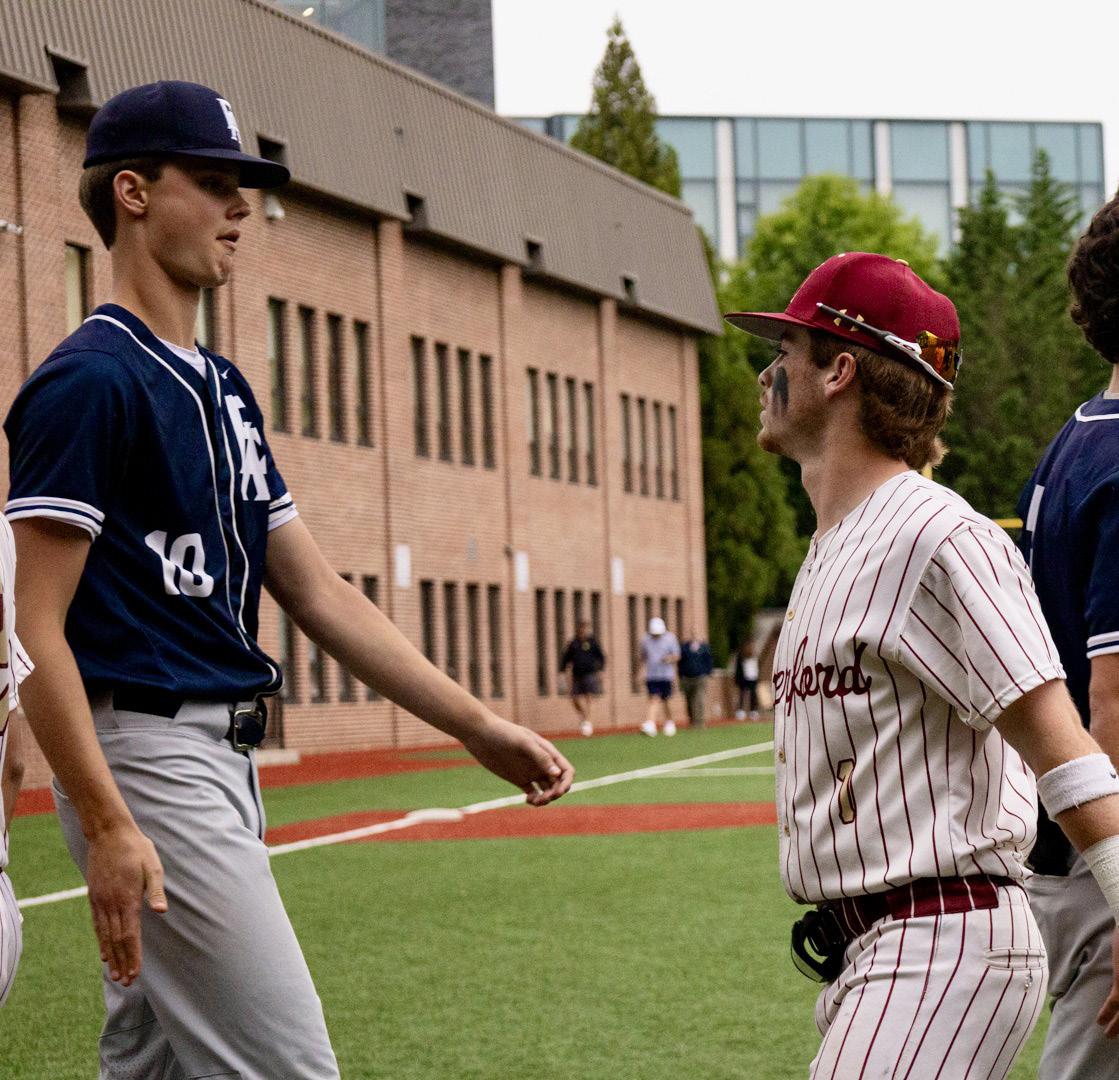
even the team that went on to win it.
“This season went well; we won many games and could turn it on when needed. Unfortunately, we just didn’t get the job done in the big moments and struggled to score in times when we needed it at the end,”
Fifth Former Zac Fuscaldo said. “We didn’t achieve the goals we set at the beginning of the season, but we showed that on any given
day, we could beat anybody. The seniors did a great job leading the team the whole season and were mentors to the younger guys the whole year.”
Despite not being able to win the championship, the Fords will be confident going into next season because of their skill and experience, and they will keep their heads high and look back on a remarkable year.
Quintin Bowers ’24, Grey Benson ’25, Lowen Etherington ’24, Daniel Belden ’24, and Miguel Duska ’25 after a race at the Stotesbury Rega a, May 17, 2024 Grey Benson ’25On May 18, 2024, the track and field team attended the Pennsylvania Independent School Athletic Association (PAISAA) Championship. After a third-place finish at the InterAc Championship, the team looked forward to PAISAA to redeem themselves, and they did just that.
Inniss hoped they could set a new record if he was given the baton when the clock was under 6:10.
Third Former Bryan Tucker, Jr., Fourth Former Colin Toth, Fifth Former Finn Kelly, and Sixth Former Andre Inniss hoped they could set a school record in the 4x800. Inniss, the relay’s anchor, told Kelly they could set a new record if he was given the baton when the clock was under 6:10.
The team would need to hold a pace of 2:03 or less to achieve a new record. Tucker set off strong at 2:02, and then Toth ran a solid 2:04. It was Kelly’s turn.
“ e guys ran hard, man. I’m proud of them.”
COACH JAMES HAWKINS
“I was excited,” Kelly said, “I kind of just went and put all my effort out there because I didn’t have any special tactics for run-
ning the 800.” Kelly ran an amazing 2:00.
Then Inniss was up. The clock was at 6:06, so a record was achievable.
Inniss powered through the final 800 and ran a 2:01 to set the school record at 8:07.
“When we saw Andre cross the line at 8:07, we all got super excited with us four and the rest of the team,” Kelly said. “Ev-
eryone was super supportive, and I think the rest of the meet felt much more fun because of the performance,” Kelly said.
Tucker, Inniss, Third Former Haven Hoilett, and Sixth Former Keegan Jacobs, who ran the 4x400, set another new school record of 3:23.20 at the Inter-Ac Championship.
Then, at PAISAA, they broke their re-
cord again and ran a 3:22.43, winning the race and setting a new PAISAA Championship record.
Fifth Former Avery Gordon won the Inter-Ac and PAISAA gold medals in the long jump. He reached 21-07.50 at PAISAA.
“The guys ran hard, man,” Varsity Track and Field Coach James Hawkins said. “I’m proud of them.”


The Index congratulates Mr. Jarrett Tate on his return to his homestate of Georgia. We would like to thank him for his contributions to the students and college counseling office and wish him luck in his future endeavors.
